#i guess just parallels within the intimate scenes
Explore tagged Tumblr posts
Text














Polin + Intimate Parallels
#idk what this is#i guess just parallels within the intimate scenes#polin#penelope x colin#colin x penelope#penelope featherington#colin bridgerton#nicola coughlan#luke newton#love#bridgerton#🔥🔥🔥#3x4#3x5#3x8
935 notes
·
View notes
Note
hey! i really enjoy your analysis of aang and zuko's relationship, and i was just wondering if you have any thoughts on this:
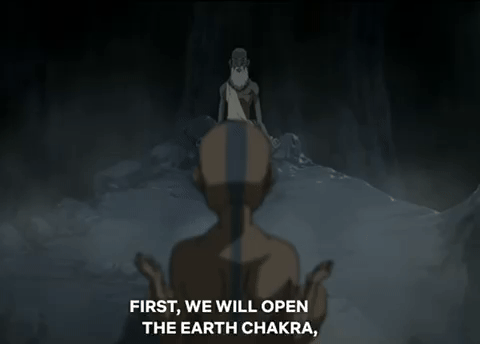
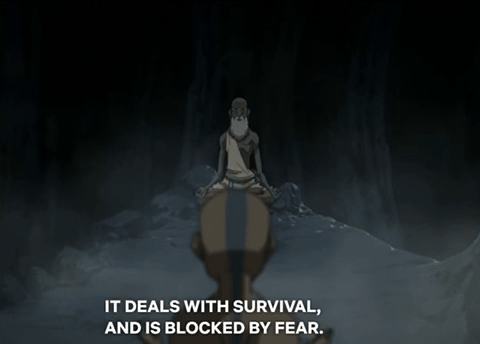
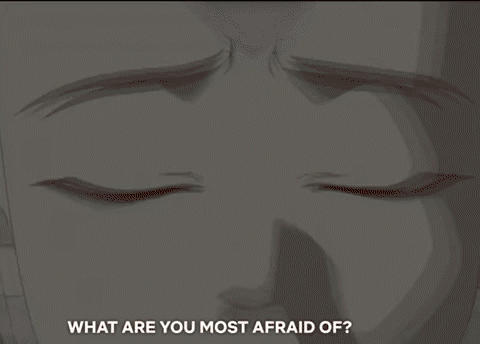
when aang considers what he's afraid of the most, he doesn't just see zuko - he sees the blue spirit. why do you think his fear is linked to that mask? zuko was the most amicable towards him when he put that mask on, and was hostile every other time.
Ooooh!! This is such a rich and meaty question!! And it's something I've wondered about but never dove into before.
I guess there are a couple of questions we need to explore. One, do we want to begin to analyze this from Aang's perspective or the series' themes, which, when put together, should offer us the fullest idea of what the intent might be? If we begin with Aang's perspective, then the next question we need to next ask what is Aang's view of Zuko and/or the Blue Spirit at this point in the narrative? My worry about beginning at that intimate level is that we might miss possible connections that a thematic understanding might facilitate and may, like many fandom analyses, leave it at a character level when, in fact, the characters exist to serve larger philosophical purposes, especially in a show like ATLA.
So, we'll return to those questions about Aang after we visit some questions about the broader themes here. We know for a fact that the team did a lot of research into Eastern philosophies that they had to then pack down into 24 minute episodes, preserving a surprising amount of complexity not in the words but in the actions and visuals. The 2 part Crossroads of Destiny episode is probably the most evocative of this practice. The four-way fight scene is celebrated for the way it masterfully shows character development through fight choreography. Then, Aang's crystal chamber he forms to master the Avatar State is a direct reference to a statement about pre-enlightenment in one of the foundational texts about Japanese Zen for American Buddhists, "The Three Pillars of Zen." The rapid explanations of the seven chakras with Guru Pathik might seem like a a skimming of Tantric beliefs based on the brief statements and processing, but it's another prime example the way ATLA suffuses meaning beyond the script.
What more can be said about the Earth (also called the Root or Muladhara) Chakra, then, that the show might reflect without stating it explicitly. Guru Pathik explains that the Earth Chakra "deals with survival." Is there any subject more prescient than that for our protagonist, the single survivor of an otherwise all-encompassing genocide? Other accounts of this chakra that I can find explain that it's at this chakra that one can observe that their base needs are being met--enough food, enough water, etc. There seems to be a subtle witnessing to the effects of PTSD here then. With this chakra untouched, unopened, and out of balance, Aang within his mind has been living in a state of emergency without knowing it, believing himself at a core level beyond his consciousness to still be under immediate threat even in moments of peace like his meditations throughout the opening of his chakras. "Your vision is not real," Guru Pathik points out, not to say that no danger exists for him in the world but to illuminate the immediate reality surrounding his person.
The memories and visions that flash during the sequence hint at how fear conceals deeper realities and thus possibilities. I'll start with the clip of Katara sinking away from the first episode of Book 2, "The Avatar State." The Earth Kingdom General performed this cruelty after many other attempts to force Aang into suffering to gain the Avatar State. Believing he lost another person he loved, the state was triggered despite the actuality that Katara was unharmed. The fear of her loss overwhelmed Aang, and even her safe return could not assuage his traumatic response. The Blue Spirit incident forms a striking parallel to this event, in that case. Aang felt himself helpless and in danger only to discover the opposite: the seemingly malevolent force freed him from danger. Further, that Blue Spirit Mask concealed Zuko who, by the end of the series, will be revealed (to himself and) Aang as an ally and a friend. The shadowy image of Ozai, then, connected with these two fear-inducing semblances, can be seen then as perhaps the ultimate foreshadowing of Aang's ultimate success in pacifying Ozai. Put in the context of this chakra and the other two visions, it frames the Firelord as a facade meant to induce terror and distance, when in reality, life and humanity still lay behind the horrifying megalomania.
Concerning the Blue Spirit element specifically in the series, I want to explore one more factor within the series before getting back to Aang's character relationship in this moment. Blue has a running symbolic theme within the series that seems especially relevant here since it played a huge role in a highly symbolic part of the directly previous episode, "The Earth King." As Zuko rides out his psychogenic fever induced by releasing Aang's bison and abandoning his Blue Spirit mask, he is confronted in his dreams by a blue dragon voiced by Azula and a red dragon voiced by Iroh. I felt really confused by these two would-be shoulder angels for the longest time (literally until I was sorting my thoughts out to write this) because Azula's blue dragon is the one who entreats Zuko to rest, which even in Grey Delisle/Azula's clearly threatening tone--she even ends the temptation by saying "sleep just like mother!"--seemed to be what Zuko needed to do as opposed to the red dragon's exhortations to get out. I could see how sleeping might also refer to accepting his upbringing without thought, but why blue? The layers upon layers of possible meaning overwhelmed me.
I posit that blue in the series, especially when put in relationship to red/orange, as it is in the dream sequence, the dynamic between the water tribe and the fire nation, the fire of zuko and azula (especially the final agni kai), and the energy-bending of Aang over Ozai in the finale, ought to be read as Yin (making red/orange yang). Yin is passive, retractive, and receptive, which makes the invitation to rest by a blue dragon make perfect sense. Yin is also feminine in nature, hence the association with both Azula (whose blue fire and lightning becomes especially interesting to explore under this understanding) and Zuko's mother in the dualistic dragon dream. If you know anything about yin and yang, you know that it's key tenet is ever-changing coordination of yin and yang within one entity and with relationships between entities rather than the privileging of one above another. The two dragons in Zuko's dream, while seemingly in opposition to one another, are actually seeking, like the bumper stickers say, "coexistence" of their dispositions.
Now, back to Aang's vision of fear over the Blue Spirit. The red that overlays everything is specifically a reference to the Earth Chakra, which is symbolized by the color red. But the fact that he has one fear of Katara, the pinnacle of blueness/yin in the series, dying, and another fear of the Blue Spirit, a de-flamed (read: emasculated) Zuko attacking him that are then overlayed by this Earth Chakra red, a color otherwise used to portray yang (masculinity, activeness, expansion, and repulsion) and the fire nation in the series, suggests that his fears are specifically about within holding onto yin nature (symbolized by his grasping for a disappearing Katara) without being entirely overwhelmed by it (in the image of the fear he felt as the Blue Spirit approached his imprisoned body). And all those fears are intensified when living in such a patriarchal, or yang-skewed age and society, which gets depicted through both the final image of Ozai, the ultimate patriarch within this world, and the red coloring.
I promised I would get back to the characters, and after that hopefully illuminating thematic expansion, we can hopefully get at the core of what's going on here for Aang personally and what it might mean for him to be picturing Zuko with the Blue Spirit mask as a fear. I want to put this moment into context with Aang and Zuko's relationship at this specific moment. Aang hasn't seen Zuko since he watched him cry over his uncle in the ghost town after Azula struck him with lightning as a diversion. That was ten episodes prior (and more than 6 months time if you were watching the show in real time as it premiered; May 26th-Dec. 1st). The next time Aang sees Zuko, two episodes later, they are glowering across a crystal prison cell at one another with antipathy as they're embraced (a gesture I can only remember from the fantastic black romance film Love & Basketball, and in a gay context that is clearly referencing that moment in L&B, in the Norwegian teen romance series Skam). Right before this scene, Aang readily agrees to co-rescue Zuko and Katara with Uncle Iroh despite Sokka's protestations. Nothing seems amiss with Aang, no obvious belligerence toward Zuko until he sees him. Zuko has barely seen the airbender this whole season, and the one moment they encountered one another, Zuko was attacking Aang's attacker rather than him. Why is Aang expressing anger toward Zuko in the crystal chamber then? It's a rare expression from Aang even when we look at their more antagonistic interactions from the first season.
Here's where this vision of the blue spirit Aang envisions as he opens his earth chakra might enliven his characterization and his relationship to Zuko. We get two pieces here. His attachment to Katara and the queer implications of his partnership with the Blue Spirit/Zuko. And they are inseparable.
I don't feel that I need to especially dive into the attachment to Katara since it's been a pretty big component of discourse within the fandom, both in general analysis and more specifically relating to the (literally historic) shipping wars between zutara and kataang that emerged after the series came out originally. What I'll say here is that the first vision that Aang has as he addresses his root chakra points to his fear of losing her and what she represents pretty explicitly and, as I suggested earlier, also provides its antidote in the realization that accepting/surrendering the fear of impermanence reveals its simultaneous illusion. Katara wasn't actually harmed and wasn't truly lost when the general subsumed her into the ground. Aang has to let go of her as a permanent fixture that he'll always be able to see and know entirely (not, as many have interpreted it, let go of loving her). He'll also have to let go of saving her and the world of so many others she represents, which is as much a pressure and role Katara and others put on him as Aang yolks himself to.
Part of this acknowledgement of Katara's impermanence as a living being and a romantic possibility is addressing the others in her life who pose both danger and attraction for her. Zuko embodies both of these things simultaneously. The aggressive stare Aang launches at Zuko in "The Crossroads of Destiny" can be understood through this lens. The Eve Sedgwick's concept of the triangulation of male homosocial desire between romantic rivals was one of the foundational ideas of queer theory. It's so well-established as to be a meme among the tumblr crowd. The show even references the history of these literary homosocial tropes in "The Avatar and the Firelord" as Sozin and Roku's tight-knit youthful friendship is slowly rent apart at the event of Roku's heterosexual marriage, which thus begins the imperialism of the Fire nation.
Except that Roku and Sozin aren't romantic rivals. And Zuko's obsession with Aang begins sans Katara. And, as you pointed out, if the romantic threat is Zuko, it ought to be Zuko in the Earth Chakra vision instead of the Blue Spirit? Well, those all exist because ATLA is not a tragedy for homosocial relationships, and it's hard for me to explain how groundbreaking that was.
You see, the show theorizes homosociality differently. If Aang is required to let go of Katara, he has no pivot point, no object (because women shouldn't be objects for male fodder!) to connect with and compete with a rival male, so he has to look directly at the desire of another male for him and, therefore, face the fears that he might have similar desires. I said above that the Blue Spirit is an entirely de-flamed Zuko, which I then paralleled to emasculation. One could even go farther to call it a kind of symbolic castration (Firelord Ozai losing his firebending at the end of the series certainly demands this kind of reading). These aspects ignite fears about lacking masculinity which then cause reactions, which make men avoid accepting any thoughts and behaviors associated with vulnerability and homosexuality invoked within themselves or by others.
I think Aang, in his way, is confronting these fears but not from the angle of someone raised within a homophobic or misogynistic culture. His openness to Zuko and the potential of connection to him is ripe from the first time they meet--"you're just a teenager" connects them without any intermediary. He comes to understand the rigidness of the environment he's in, though. He feels like he's being forced to choose between a yang/masculine role he plays with Katara, who at this point in the series though growing out of it and certainly not a fault of her own making still sees him as her savior and depends on him to save her and the world through metaphysical mastery and the repulsion of evil, and yin/feminine role he plays with Zuko, who finds Aang in and forces him into positions of elusion, surrender, and passivity, while requiring his compassion and forgiveness. When the Blue Spirit comes swinging his swords (read that with all the innuendos you want lol) at a shackled Aang, it's the ultimate expression of Aang's potential for submissiveness because, not only is he entirely helpless but the one who could harm or save him in that scenario is another who is not participating in the expected power of fire/yang/masculinity.
I think everything in the show says this is attractive to Aang--that he remains with Zuko immediately after their escape from the fort, that he reflects on the Blue Spirit as he opens his chakras, that a reference to the conversation that followed their escape that Zuko makes halts him in his tracks when Zuko asks to join the team. Zuko's Blue Spirit persona means a lot to Aang, a scary amount, and my point is that it's this fear of the meaningfulness of their encounter as two men who are not the masculine paragons they are supposed to be which Aang faces as he opens his chakra. As much as he wants Katara, he wants Zuko. He fears he'll lose Katara and he fears he'll lose his life to Zuko. These are the dichotomies he's tackling as he processes the Earth chakra.
Aang eventually opens the chakra, but that's only to say he acknowledges and surrenders his fears to a destiny and understanding beyond his control, not that he necessarily learns how to address and solve all the conundrums contained therein. We know he chooses his attachment to Katara at the end of the episode to obtain power over the Avatar state but perhaps we could've been clued into this choice by noticing he has not chosen Zuko with that initial glare Aang gives him. Aang hasn't found a way in his chakras or his heart to hold both Katara and Zuko at once, so he chooses Katara and expresses a newfound jealousy and rivalry toward Zuko (not that Zuko's at his best behavior at this point, but it's Aang who initiates the exchange).
By the end of this season, Zuko abandons the Blue Spirit mask and Aang loses his life for prioritizing Katara and a yang-centric mastery of the Avatar state. The next season involves all three of the protagonists finding more internal balance between yin and yang for themselves and accepting mutually reciprocal feelings for one another that allow them to escape the kinds of patriarchal tropes that have dominated Anglo- literature for centuries. The ability of this brief sequence to highlight so many of the series' central revolutionary themes speaks to the depth of the show and the way it invites the audience to think about rich subtext rather than pedantically hammer us with morals will just continue to be the gift that keeps giving from this show.
Thanks so much for asking! Didn't know how much I missed doing a deep dive into this kind of stuff.
93 notes
·
View notes
Text
To elaborate that post about shipping as if it's based on a points system, the specific incident was that the moment in the latest WBN that made me go "oh, yeah, this seems romantic" was Suvi giving her name to Ame before the ceremony, and holding Ame's hand to write it out, and the two touching foreheads as they talked about what was going on. Everything else has really felt within the realm of "best friend" and specifically "best childhood friend I haven't really seen in a long time, but left an indelible mark on me," which is still a profound bond, but this is the first moment that really felt it went beyond that. And it was a beautiful moment! I think that while Eursulon and Suvi clearly love each other dearly, his response was one of "what is this strange world," whereas Ame seemed to have a better sense of the gravity of the occasion, and Suvi was able to open up to her more (and then run away for having done so, natch).
So it is a little frustrating that so much focus is on the conversation later in the episode, when Indra's message reaches Ame in the bathroom while Suvi is also there; and on Suvi reflecting on this as she goes to see Silver; and comparatively little on that smaller, far more intimate and profound scene.
It's not that the part at the after party isn't fun, but it's pretty standard Drunk Female Friends In The Bathroom except, you know, witchcraft messages. I don't say this insultingly at all - I loved it and think the juxtoposition of that vibe with the incredibly solemn naming ceremony, realization of Ame's position, and - but it feels very much like a wacky sitcom plot, particularly with the Fox's interjections. And then the focus on Suvi very reasonably thinking about her friend, who has just come into her role as Witch of the World's Heart, as she walks to Silver's place is just. You can have more than one relationship - and I mean this purely in the term of Closeness With Other People - at once, and indeed, I hope you do! I hope that if you have a romantic partner you also think a lot about your friends! I hope that you think about one friend who's going through a lot while also spending time with other friends! And what's truly wild is that I like Silver a lot, and I also don't really get the sense that will be an endgame romance and we are very early into what will be a very long campaign. There's no need to try to get him out of the picture at this point, and focusing on that still ends up focusing more on him than on the scene!
I guess the best way to put it is that like, this mentality of shipping - the points system - feels like it's behind truly everything I can't stand with shipping in fandom. It's behind such meaningless shipping bullshit microexpressions (not true here obviously but in video format) and (in actual play) coincidental matching dice rolls and vague mechanical parallels for sure, and interpretations like the bathroom scene where I'm like "do you guys have any meaningful platonic relationships in your life," and definitely the thing I said yesterday about mean-spiritedness. It's about "who does this person agree with on this particular issue that's the subject of this episode" and not "who do they have a longstanding history of being able to work through conflict in a loving way." It's about this idea of only being able to think about one person or thing at once. It's about a focus on a monogamous endgame in a cottage above all to the point that you can't enjoy the journey, which really makes me wonder what you're getting out of shipping. It feels very, if you'll excuse the math reference, like a Markov chain sort of mentality where the present state supersedes all of the past, which really misses the entire point of a long-form narrative. It's like more points and also last person to do something wins which is just the grimmest way to think of love and romance I could possibly imagine, and it's so fucking prevalent, and that's before I even get to how it doesn't even tally the points right, both in that smaller but deeper scenes get ignored and if everything had gone super well with Silver I know for a fact people would just go "I do not see it". Like, people pick the winner (arbitrary personal preference) and then backfill the evidence while pretending it's a points based game and none of this makes sense in the context of "experiencing a longform fictional narrative." And then if it doesn't happen they call for a referee and act cheated and lied to and don't realize it's because they ignored 75% of the game. Like. Is it fun being this deliberately obtuse? Is it really?
anyway point being I ship it but already cannot stand like 90% of the shippers, who are spending most of their efforts coming up with a completely unnecessary ship name anyway, which I think is indicative of truly everything going on here.
#wbn tag#i detest cutesy ship names which is funny because i'm better at them than everyone who likes them. sky heart? be serious.#anyway. i have found that rather than engaging in ship wars one should critique someone's entire approach to fiction#it's...sort of easy if you're smart enough it's free it's fun
28 notes
·
View notes
Text
youtube
Is Willow a bad person for getting with somebody like Kennedy? It’s a relevant question to ask.
Well, I think it’s been established for quite awhile now that Willow can be a pretty bad person herself. And I don’t mean the Dark Willow thing. I mean her tendency to control or fix things to her liking.
Is it intentional? No, I don’t believe so. But nevertheless she’s too much of a wild card to realistically go into a new relationship with anyone. It’s not just about the struggle of moving on from Tara and letting herself go to be intimate with Kennedy. It’s about the fact that she’s got a lot of shit to sort out upstairs. She’s got to grow as a person. She’s got to learn her own worth. She’s got to learn to love herself. And then she can love someone else. Even someone like Kennedy, who is just as impulsive, if not more than she is. Is quick to reaction out of feeling uncomfortable. Wanting to have the last word in. Willow is pretty lenient in comparison but she’s still someone who wants it her way. She’s still someone who wants to dominate.
Willow needs to expand on her self-awareness. Even in the scene where she had to confront Spike about Buffy’s whereabouts, she’s pretty oblivious to how she sounds to him in lying to him about it. She doesn’t realize that he is not believing a word of it and that’s because, unlike her, Spike is very self-aware. Especially now that he has a soul. He is aware of his reactions and emotions being a reactive and emotional being himself. And they no longer parallel each other like they did in Season 6.
Don’t get me wrong. Willow is a very human - and therefore relatable - character… but she is still one of the most questionable characters in the show. I might be able to read her for filth but most people won’t be because her “innocent” act is convincing. And she might have learned that actions have risks and consequences coming back from the tail-spin of her lowest moment, but she’s still mentally and emotionally unstable. She’s still someone that is chaotic and not in control of her immense power. And I feel like if she even steps one toe out of line with Kennedy, she’ll regret it. The question is whether the girl can handle her being so heated herself. Or will she only serve to fan the flames even more? When push comes to shove, will Kennedy be able to quell the fire within? Tara could, you see. Every time the woman was about to burst, Tara could blanket the impact with her kindness and empathy. She perfectly balanced Willow’s nature with her own nature without really needing to try. The conversation Willow and Kennedy have just before making love would make it seem that Kennedy can too. But I’m not so sure once Willow really has to deal with adversity, she’ll be able to. I’m not so sure a more “assertive” type is the right person for her because I feel like they’re going to exacerbate their worst traits in each other when the going gets tough. They’ll eat each other alive. On the other hand though, Kennedy is much like Faith and Faith would definitely bring out in Willow her fun and liberated side as well as keep her in control and handle her fire. So maybe they could work 🤷♀️
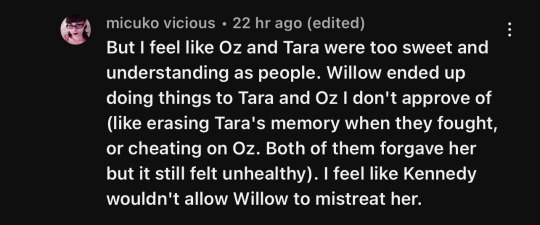
It’s true. They did. But then they also knew what to do about her anxiety as well. They knew how to calm her down. Well, at least Tara did. Oz kinda just didn’t say anything. I feel like Kennedy may be too immature for Willow and that’s especially problematic when Willow can be as well.
But I could be very wrong about it at the same time. She could be somebody Willow actually needs. I guess it just depends.
#buffy the vampire slayer#touched#willow rosenberg#alyson hannigan#kennedy#iyari limon#insecurity#self awareness#anxiety#control#naj#buffy reaction#Youtube
10 notes
·
View notes
Note
another character based question - how do you feel about mikasa? a lot of fans dont like her, im curious about how you feel! - armin anon
Hellooooo Armin Anon. OMG it’s been forever since I had the time to sit down and do a proper meta, and I apologize.
First off, I finished the manga!!! (So, spoilers ahead for anyone else reading this.) I had to lie down after reading 139. It’s a tremendous story and I’m still taking it all in. The set pieces and personal/emotional stakes of everything that happens is just astounding. If it’s one thing Isayama does good, it’s the gut-wrenching personal anguish that underlies the action. I’m absolutely floored. My favorite bit was probably the timey-wimey stuff in Paths and Eren. That blew my freaking mind. But onto Mikasa!!
A Cruel Yet Beautiful World
I remember way back when I started the anime that I started liking Mikasa first out of the group. I liked how sullenly silent and no-nonsense she was, and I liked her loyalty to Eren. Her emotion, especially when Eren died in Trost, was palpable and terrifyingly beautiful. Her grief was incredibly realistic––rushing off with a death wish that even she couldn’t succumb to in the end, because of the drive to fight that she got from Eren. In a world like SNK, her relentlessness breaking through her grief was incredibly moving. And her philosophy is basically the driving theme of SNK: “This is a cruel world, and yet so beautiful.”
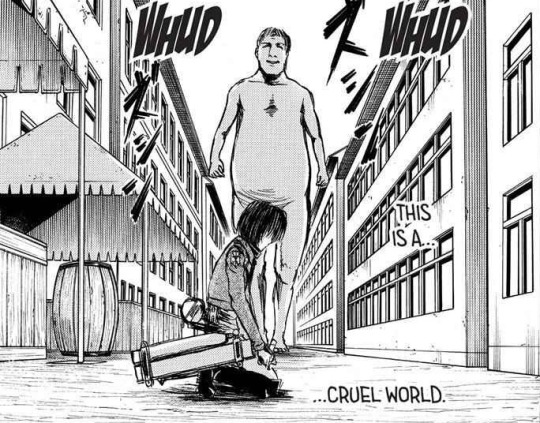
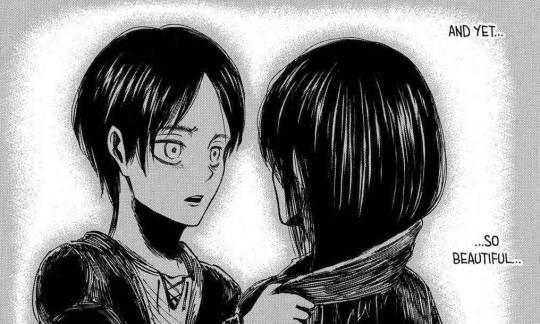
This is the same moral message she gives Eren when he can’t find the strength in him to fight Annie––and gives him that warm, understanding, inscrutable smile that allows him to finally accept his own monsters, fight Annie, and save her and Armin. (One of my favorite panels of her from the manga, actually.) Mikasa is basically the first character we meet who embodies this contradictory morality, which grows to engulf SNK and other characters as well (Levi, Reiner, and Armin especially come to mind). Which could be why I was drawn to her at the start, since the complex moral outlook of SNK was the primary reason I fell hard for this story.
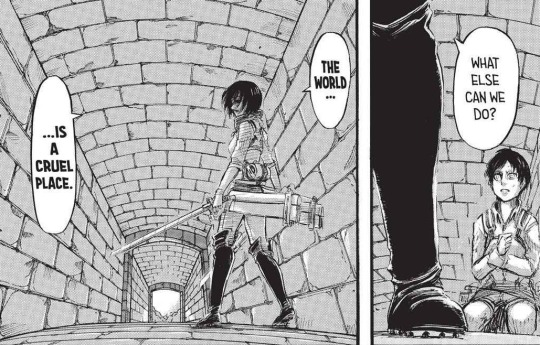

(And gosh, it’s tragic to realize that it’s teaching moments like the scene above that made Eren into the person who could influence his own child self to murder, the person who could wipe out so much of humanity, the person who could take Ymir’s challenge to free her by destroying the love of the person who cared the most about him. I’m still processing yo.)
Acker-parallels
I started really analyzing Mikasa when I had to defend her from a friend of mine who accused her of resenting Levi (for beating up Eren) and that’s why she attacked him so violently in the RTS serumbowl. Because of my research into rebutting that, a lot of my affection for Mikasa now comes in seeing the little ways in which she cares and trusts other people, including Armin, Levi, Gabi, and Jean. And her quiet sensibility that goes beyond her love and protectiveness of Eren.
With Levi in particular, I find a lot I like about her. Because you can definitely see her annoyance at him, but she also trusts him more than anyone else in the Corps outside of Armin. After Levi’s violent encounter with Historia, she was the only one who implicitly trusted Levi’s judgement, backing up Armin’s more reasoned logic. She sees beyond her own emotions and even moral feelings and realizes the world is cruel enough that sometimes people have to do dark things to help others and survive.
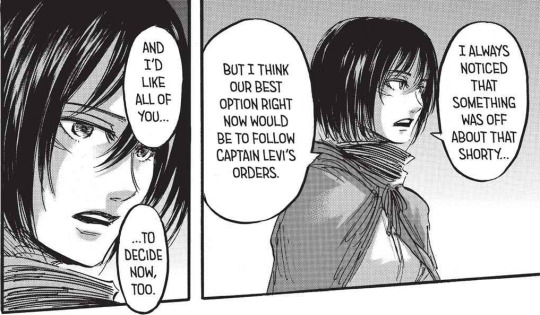
This is very much the same statement Levi made to the 104th when he had asked them to follow Erwin’s orders when the commander’s plans were questionable on the surface: “Do you trust him? Those dumb enough to say yes… come with me.�� These two understand each other on a moral level, and they ask for their comrades’ loyalty without demanding it, because they each know that everyone’s conscience is their own.
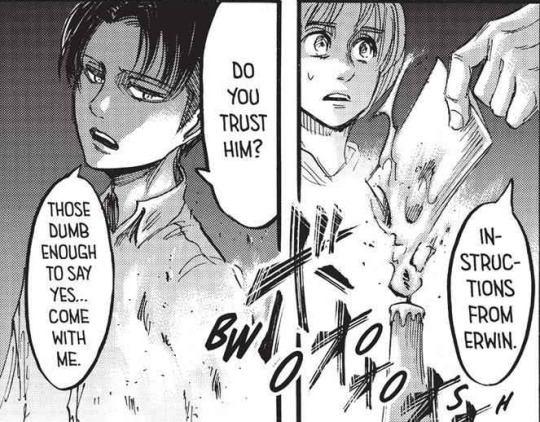
There’s a clear parallel between Mikasa and Levi, not only because of their Ackerman heritage and sensibilities (loyal to a fault to their chosen person, impossibly strong, quiet and grim), but their frustration when they cannot protect the people they are responsible for. They both know they are the strongest around, and if they cannot fulfill on that power, a lot of people will die.
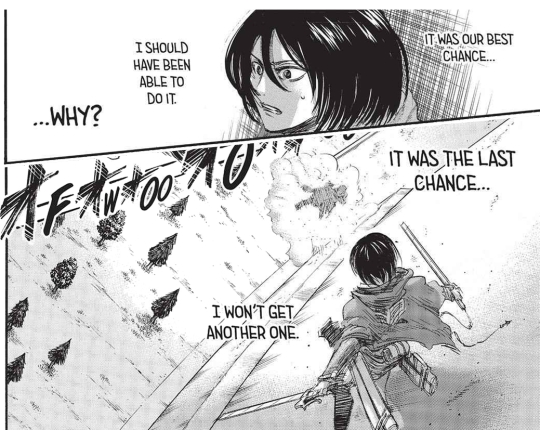
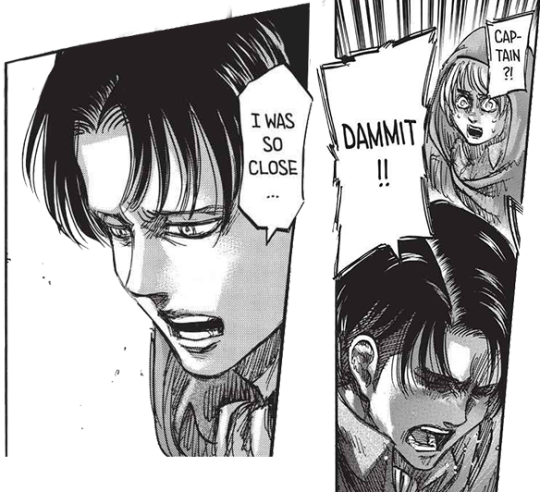
There are many moments in which Mikasa puts aside her personal feelings to do her soldierly duty, from leaving Eren to help with the evacuation of Trost to leaving Eren and Armin to fight the Colossal Titan alone in Shigonshina.
And then there’s the fact that Levi’s the one who could break past Mikasa’s headspace and distraction so that she can do the right thing. He understands her strong emotion, he respects it, but he also knows when that has to be put aside for the greater good. But he doesn’t put her down for having those emotions, either.

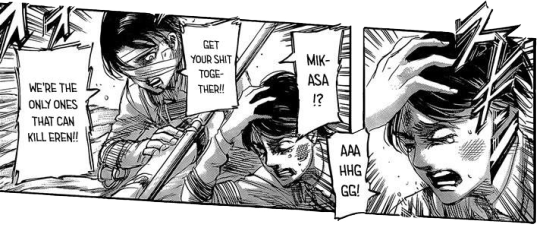
Strength from Eren, Humanity from Armin
Mikasa’s love and loyalty to Eren challenges her tremendously after the timeskip and her sorrow at Eren’s change is what really stands out to me about her character in the Marley arc. The absolute grief in her eyes when she tells Eren what he’s done is devastating, and it shows just how much goodness and compassion she does have.
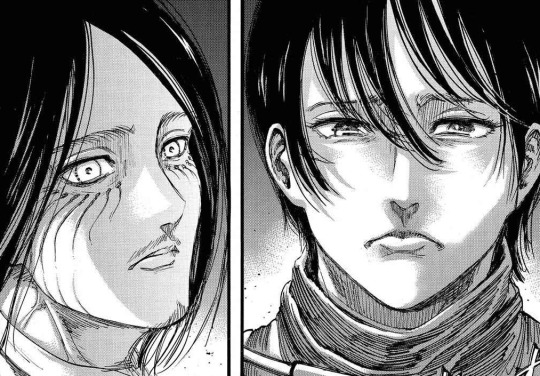
And yet she longs to understand Eren, to trust him, to believe there can be something redeeming, and not merely jaded and tired, in what he taught her so many years ago––to fight, to win, to live.
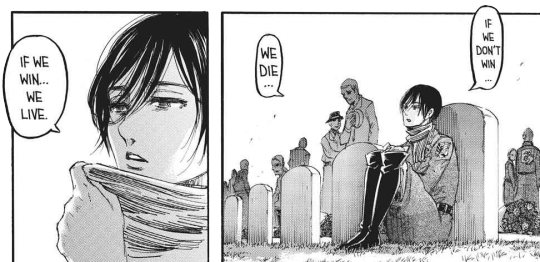
There’s such a difference between these same words said here by Mikasa, so many years later, after so much heartbreak, to the anger and flame that were in them when she first heard them, back when she realized that this was the way of the world. That death and killing happens in the natural world everyday and that’s how you survive. That the world is both cruel and beautiful.
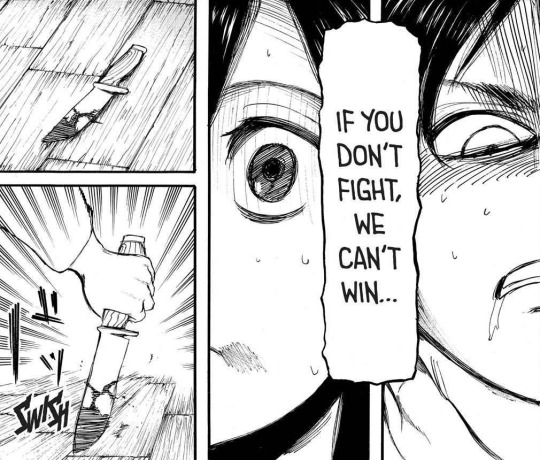
And yet as the years wore on, as Mikasa grew closer to others, found purpose in protecting others, sought a life with Eren… as she wandered further into the forest of life and society and relationships, she lost some of that simple injunction... to live is to fight, to fight is to win. She, like so many of the 104th and the others on this journey, found that it’s not enough to just fight and live and be satisfied. We really want it all to mean something, to have our actions be redemptive. To allow ourselves to believe that we do what we’re doing because we’re not just saving ourselves, but saving others, “saving the world” like Yelena points out (in the forest therapy session pfff). And it’s that drive for something bigger in our actions that grieves her so much with Eren, because as she wants her own actions to be fundamentally good and selfless, she wants his actions to be moral as well.
So while Eren is the person that frustrates Mikasa and motivates her to become stronger and braver than she ever was, Armin is the person who humanizes Mikasa and allows her the space to be gentle and vulnerable. She comforts Armin, confides in him, puts her faith in him, and puts her life in his hands.
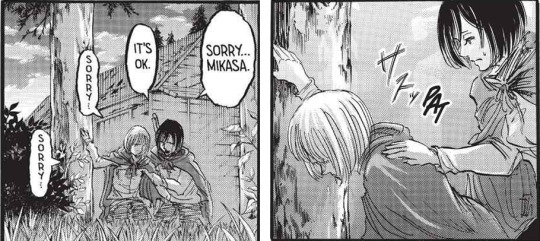
She trusts Armin with Eren, and she values Armin’s intellect and compassion, qualities she doesn’t have in nearly as much quantities as he does: “There are only so many lives I can value. And… I decided who those people were six years ago. So... you shouldn’t try to ask for my pity. Because right now, I don’t have time to spare or room in my heart.”

This bit from her confrontation with Ymir and Historia was a defining moment for me with Mikasa. It’s honest and realistic in a way that few of us care to admit about ourselves, and it’s just super chilling and badass coming from her, too. It also shows how much she fights for Armin and Eren both. They are the two people she loves the most in the world, and she never gave up on saving either of them––from death or from themselves.
I’m looking back on Trost now and finding so much irony with the ending to SNK. In Trost, she was the one to give up on Eren, telling Armin that it was hopeless to try to extract Eren’s personality from his Titan form. And yet, like in the end, it’s always been between Armin and Mikasa to try to salvage Eren’s humanity. In Trost, Armin tells Mikasa to leave––to go do what she’s good at (saving lives)––and to entrust Eren to him.
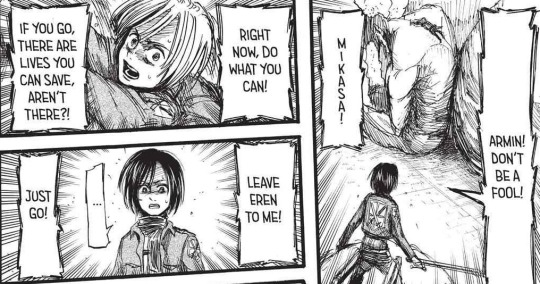
It’s a huge expression of both Mikasa’s trust in Armin, and her belief in Armin’s abilities and friendship for Eren. And in the end, it’s the two of them again debating on if there’s any humanity left in Eren. The bond they share is intimate and deep. With all the military doubting Eren and scheming to take away his Titan (with even Jean and Connie unavailable to them emotionally), it’s only Armin and Mikasa against the world––the only two people who can truly consider Eren’s actions and hold off on judging him. And you can feel their love for him even as they doubt him.
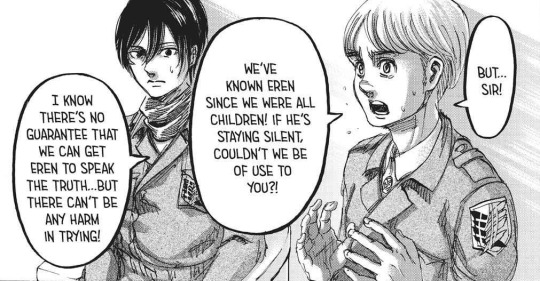
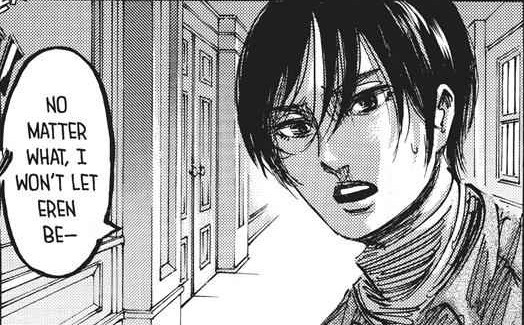
And like back then, it has always been Armin who understands Eren most, the one who recognizes his own evil and Eren’s and finds a redemption in having others stop you, because you cannot stop yourself.
And that’s the thing I really take away from SNK and from Mikasa’s journey, that we all have devils inside us, and yet there is still beauty to be found, within us and in the world––from the natural wonders that Armin dreams of, to the comfort of purpose and companionship that Mikasa has in Eren. Love and wonder is what redeems us of our devils. And yet love itself is complicated, and can turn ugly in its obsession. That giving up that love is what makes the love selfless and beautiful, what absolves us of the selfishness within us. That’s what Mikasa learned. And in the end, she was able to release that love for the good of the world.
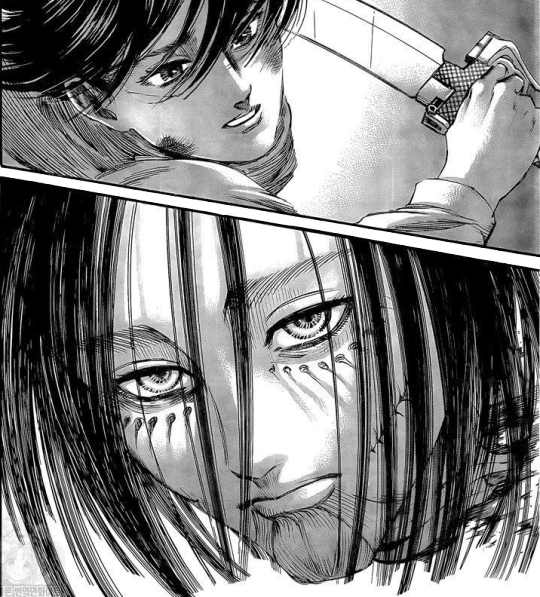
So I guess to sum up, I really love Mikasa. I can see why her dogged loyalty to Eren might annoy some fans, but I think there’s a lot more to her than simply that, and in fact, her journey and growth is heart-rending and one of the most symbolic arcs of SNK and fundamental to its entire theme. She’s a badass with a lot of emotion and depth behind her cold mask.
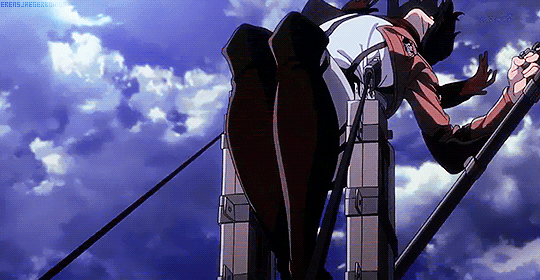
#eremika#mikasa ackerman#eren yeager#armin arlert#levi ackerman#aot meta#snk meta#shingeki no kyojin#attack on titan#snk#aot#attack on titan meta#attack on titan analysis#snk analysis#mikasa ackerman analysis#mikasa ackerman meta#shigonshina trio#ask#armin anon#*mymeta#*mythoughts#*mine#long post
241 notes
·
View notes
Text
Rambling About Sk8 Infinity 'Cause I Just Caught Up
So yeah, when I initially watched it, literally my first reaction was "aw man, it looks like this show will have no real consequences for any of the main characters' actions, that's the typical shonen formula I guess." Then, as if a direct frick you to me, there WERE consequences. It didn't come from the reckless skating or beefing with scary competitors, no, it came from the person who's kinda the hero of the series, Langa, being TOO good at fulfilling his role and leaving Reki to feel left behind and like he can't match up to the rest of his comrades. Now this is resolved rather quickly within the span of 3 episodes, but what I think made it stand out to me was the way it was resolved and the perspective that this conflict was seen from. You see I think Reki's little mini arc here goes to show you the shonen hero from the perspective of his weaker companion. We've had stuff like this before but I think it's special here because 1.It shows the perspective of the weaker comrade and STAYS there. 2. Even when these characters get frustrated at their lack of strength, there's usually a scene where the protag will say some pseudo-inspirational garbage at this character. This is never genuinely done by the writers to empower the weaker character. It's done to make the hero stand out even more for being a nice person ON TOP of being a badass shonen hero. (man, aren't we getting the whole package...>:/ ) and the way the resolve this, isn't by having same "manly" fight scene where the weaker character tries to prove their worth or some sh*t, no, Reki and Langa talk it out after Reki remembered why he skates. And why wouldn't they be able to do that? They're friends :) It's moments like these that kinda almost make the show feel more like a Shoujo than a Shounen to me. Good series is good series, 7.7/10 to bullet point the things I didn't like -Langa isn't really shown to have any flaws or insecurites, it is only season 1 though
-the character design is low-key kinda weak. There's a reason why I keep comparing them to Katekyo Hitman Reborn and Kingdom Hearts characters, it's because their designs are super generic that you mix them with character designs from other anime and anime-like media in your head. Even with the designs I do like, Reki and Miya's, I feel like their silhouettes aren't that interesting. You can black them out and put them next to any spiky haired character (with reki) and any character with cat ears (with Miya), and they'd blend in together with all the other character if it weren't for those skateboards -creepy villian. Man with bad touch... (seriously though, why is the default for making a villian scarier, making them rapey? they did it with Sephiroth in ff7 and Scar from the lion king if you saw that deleted song...It's weird) Alright now lets's talk about the important thing here. The real reason I kept watching, and it's not the skateboarding scenes (though those are well directed). It's, T H E Y. Not even because of the ship, but because their relationship is just really cute, healthy, and just like wholesome my dude....BUT NOW LET'S TALK ABOUT THE SHIPPING ASPECT SHALL WE?

wow, there's so much gay in these two, they could rid the world of heterosexuality with a doom impending glitter gay bomb lol. Seriously though, I knew everyone shipped them so I expected them to be extremely close and maybe have a little bit of not-straight implications. Shounen tends to have moments between its male characters that are very intimate and can be seen as romantic, regaurdless if that was the intention or not, but I didn't expect the implications to be THIS blatant. I feel like even the "dude-bros" had a hard time trying to keep it straight. From the very beginning they get along almost immediately and never really went through any real rivalry phase. Even when Reki avoided Langa and quit skating, it wasn't because of any bitter feelings towards Langa, but because he was getting insecure and felt like he couldn't stand to him. For most of the series, they continue to inspire each other throughout the series and become each others main motivations for waking up happy and just skating. One of the biggest examples is the scene where Reki races with ADAM and another being when Langa races with Kojiro. Even when Reki gets, dang-near molested and the race track and loses courage, it's Langa's words that reminded him of what he was fighting for and gets his head back in the game, even if he does end up losing. With Langa, it wasn't until he saw Reki's face and heard his voice from the crowd, did he start to feel passionate about winning the race, as his hearts not in skating, if he can do it with the person who got him into it (he really asked Reki if they could skate for infinity ah *cries*) (It kind of makes me wonder if the original manga writer wrote a bunch of BL before writing Sk8 and is stuck in this awkard phase were they are literally incapable of writing to male main characters who AREN'T into each other or if they are just going to make Reki and Langa a couple. I'm gonna guess it's the first one, because let's be real, when companies see that people ship a gay pairing, they WILL pander to the fraction that ships it shamelessly and then will never go through with it in the end. I'd be happy to be wrong here though.)
Aw yes, one more thing before I go. I like to think that these two scenes were meant to parallel each other:


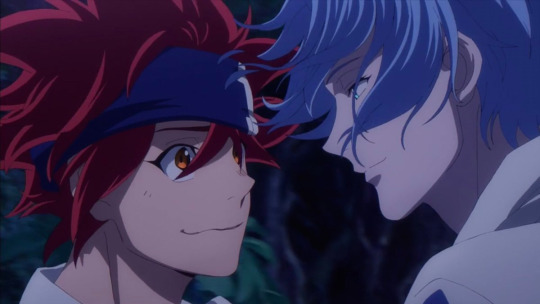
uhhh Okay, so you can barely tell but these pictures are basically Reki, Langa, and Adam tangoing with each other on skateboards. I like to interpret as Langa being able to turn what has been seen to be spirit breaking for Reki into something positive, if only for a brief moment. A more intellectual queer could put the relationship between these 3 through a queer theory lens and say that they represent being in vs being out of the closet, a metphor for grooming, or perhaps even trying to reclaim your youth, but to be frank, my a** is not fat enough, nor is my brain big enough to be this person.
#sk8 episode 10#sk8 the infinity#sk8 langa#sk8 reki#sk8 renga#he's still a sk8r boi :')#*gets on one knee* Reki will you be my sk8r boi?#shipping
15 notes
·
View notes
Text
A Season 6 Bellarke Recap [a.k.a. the Receipts]
Before the finale airs, I thought we were due for a recap of some of the major B/C moments of Season 6, episode by episode.
6x01 “Sanctum”
[a.k.a. “It’s not crazy.”]
This felt like such a turning point for Bellarke, particularly on Bellamy’s end, because you can finally see him starting to fill in the blanks of their relationship. Clarke is so tentative and reticent about addressing the radio calls. Bellamy recognizes her vulnerability, understands the significance of this admission. And by assuring her “it’s not crazy” that she depended on him for six years, he reveals that he relied on her memory just as much, thus affirming the strength and stability of their relationship. Devotion is the name of the game.
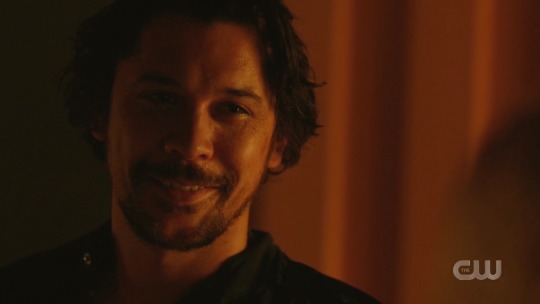
6x02 “Red Sun Rising”
[a.k.a. “I don’t need you anymore.” + “This time, you die. Not me.”]
Talk about Foreshadowing™. This episode allowed audiences to get into the heads of each character (sans body snatching) and fully grasp what it is that drives/haunts them. Case in point, during Bellamy’s red sun psychotic episode, his compulsive need to protect and save his people is underscored, as is his deep-seated fear of being abandoned by/losing Clarke. This illustrates how, to a certain extent, Bellamy is terrified of how much he depends upon Clarke, knowing fully well the toll her death took on him for the past six years.
6x03 “The Children of Gabriel”
[a.k.a. “She is. She can speak for us.” + “We’ll bring Madi back. I promise.”]
Though the two are separated for the majority of this episode, Bellamy and Clarke’s “Together” partnership and co-leading dynamic are back in full force. Theirs is a relationship built on trust and mutual respect, a fact made very apparent when Bellamy doesn’t hesitate to allow Clarke to unilaterally conduct diplomatic affairs in Sanctum while he reconnects with their people. Likewise, Clarke entrusts the safety of her daughter to Bellamy in spite of the calamitous series of events that transpired in Season 5. It’s truly a redressal of S5, and it establishes how a relationship as profound as theirs is only strengthened by past disputes, betrayals, and grievances.
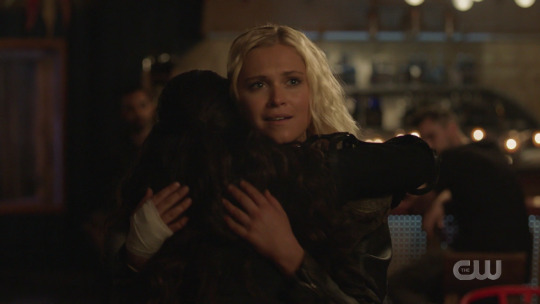
6x04 “The Face Behind the Glass”
[a.k.a. “You’re my family, too.” + “You’re too important to me.”]
I found this moment particularly significant when juxtaposed with the B/C dynamic in Season 2. Clarke’s “You’re too important to me” is very reminiscent of her S2 “I can’t lose you, too,” only this time around Clarke doesn’t attempt to diminish Bellamy’s value to her and, instead, recognizes that her love for him is a strength, not a weakness. She conveys to him how deeply she regrets abandoning him at the pits (much like her abandonment of him at the gates of Arkadia in S2), vowing to never lose sight of the fact that he is and always will be family to her.
6x05 “The Gospel of Josephine”
[a.k.a. “How are we on different sides of this?”+ “Who are you?”]
The strength of B/C’s relationship is even further bolstered with Josephine acting as a foil character to Clarke. Bellamy and Clarke know and understand each other so well, and her absence is glaringly obvious to Bellamy when he recognizes how uncharacteristically out-of-sync they are. He is the first and only person to have figured out that Clarke had been bodysnatched purely from knowing who she is as a person—her mannerisms, the way she speaks, the way she thinks, the things she values most (the same cannot be said of her own mother, but c’est la vie).
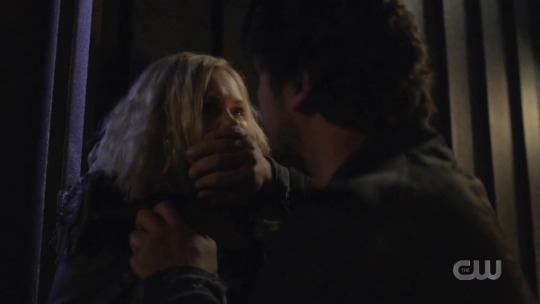
6x06 “Memento Mori”
[a.k.a. “...the hardest decision of his life: he will not take revenge.”]
Bellamy reveals the depth of his love for Clarke not by being consumed with his desire to exact revenge on her murderers, but rather by pushing aside his rage and grief in order to honor her. His inconsolable, bereaved, emotionally volatile state screams at him to perpetuate the cycle of war and violence, yet he overrrides his natural bloodthirsty instincts, all for Clarke. Bellamy is a fighter, and him choosing not to fight to preserve Clarke’s legacy is precisely why his love for her must be true and abiding—a love that stands the test of time and transcends death.
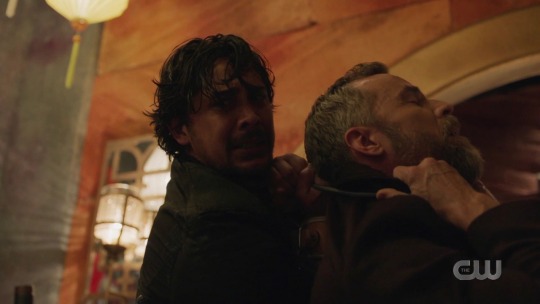
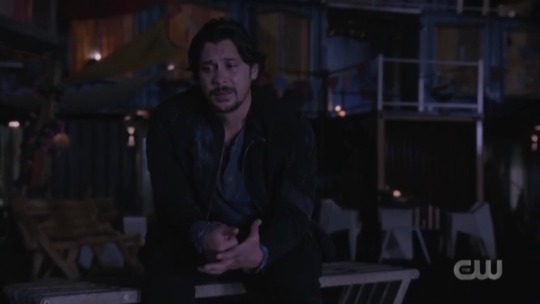
6x07 “Nevermind”
[a.k.a. “You’re too afraid to face him.” + “I’ll take your deal.” vs. “We’re gonna get her back.”]
The noticeable absence of Bellamy in Clarke’s mindspace (save for the drawings of him on her cell walls) is very weighty, especially when accompanied by Mindspace Blodreina’s spiel about Clarke‘s subconscious being unable to conjure Bellamy up due to fear. Fear that he will always resent her for her mistakes, fear that he views her as a selfish monster. It’s evident that Clarke values Bellamy’s perception of her to an unparalleled degree. Pieces of him are scattered throughout her mindspace (notice how a sketch of him is hanging in the area of her mindspace that symbolizes home, happiness, security, and family). He is literally ingrained in her head. This makes her decision to sacrifice herself to Josephine all the more meaningful. It is only when Clarke assumes Bellamy had given up on her without a second thought that she, herself, gives up. What she doesn’t get to see is how devastated he had been by her death and how determined he is to get her back when he discovers she’s still alive.
6x08 “The Old Man and the Anomaly”
[a.k.a. “You only care about Clarke.” ATTA BOY, JORDAN]
Bellamy is a man on a mission, and he’ll stop at nothing to save Clarke, regardless of the fact that doing so potentially endangers his people and their prospects for peace. While it’s inaccurate to suggest that Bellamy “only [cares] about Clarke,” you cannot deny that in this precarious situation she takes priority above all else. Saving Clarke is more important to Bellamy than ensuring that the peace deal for his people is fleshed out without a hitch. “He’d do anything for her. To protect her. Just makes sense.” Yet another S2 parallel. Bellamy will do whatever it takes to bring Clarke back, consequences by damned. If that entails leaving his people to fend for themselves, then so be it.
6x09 “What You Take With You”
[a.k.a. “Your people are in trouble. I guess you care about her more.” + “Now that’s a weird relationship, isn’t it?” + “I won’t let you die.” + “I’m not leaving you.”]
This episode was truly an ode to the history between Bellamy and Clarke—a complex history characterized by its highs and lows, by reconciliation and betrayal—but a history of devotion, nonetheless. Bellamy’s interactions with Josephine are enlightening, to say the least. The clinical way she breaks down the complicated relationship between Bellamy and Clarke is not only a testament to who she is as a person (i.e. a psychopath) but also to how deeply B/C must care for each other. In spite of everything that’s happened between them, their love and devotion to one another remains. Josephine leaves no stone unturned when it comes to recounting the bad and the ugly aspects of Bellamy and Clarke’s relationship, yet she redacts all of the good (those deep, intimate, emotional moments must be difficult to comprehend through the eyes of a psychopath). Everything about this episode—from Bellamy’s heartfelt “I won’t let you die,” to the terror and desperation in his eyes when J!Clarke is on the chopping block, to Clarke’s adamant “I’m not leaving you”—affirms that their bond is unbreakable.
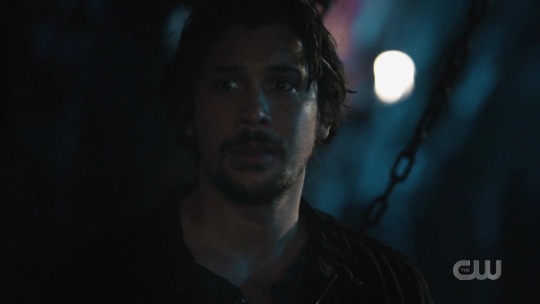
6x10 “Matryoshka”
[a.k.a. THAT SCENE]
It takes real acting chops to simultaneously rip my heart in half and stitch it back together, yet, within the span of two measly minutes, Bob Morley accomplished the feat seamlessly. When Bellamy is confronted with the reality that Clarke is dead on that operating table, his greatest fears in 6x02 paradoxically come alive before his very own eyes. “I’m not losing her again.” “I need you.” “I’m not letting you go.” The shift from denial to desperation to devastation is as breathtaking as it is heart-breaking to watch. Speaking of the heart, what elevated the CPR scene to a caliber rivaling that of poetic cinema was its overt symbolism. Bellamy is Clarke’s heart. Clarke is Bellamy’s heart. When she’s trapped in her own head, it’s Bellamy’s voice that brings her back and jumpstarts her fighter instincts. When her heart’s stopped beating, he pumps it for her. He’s begging for her to come back to him because she is his touchstone, his other half. “The heart and the head.” “The head and the heart.” In other words, we belong Together. In other words, I love you, and I don’t want to live without you.
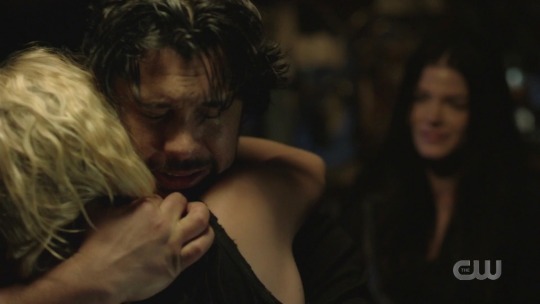
6x11 “Ashes to Ashes”
[a.k.a. “You saved me.” “So how do we save everyone that I left behind?” + “For Monty.” “For Monty.”]
The guilt sets in for Bellamy as he begins to think about the potential repercussions of his actions. Leaving everything behind to save Clarke was purely a heart move, and now that he’s got Clarke back, his head is starting to punish itself for shutting down and abandoning his people. Bellamy is off kilter and guilt-ridden. His plans for a peace deal fell apart, and he’s terrified that he won’t be able to protect his people just as he had failed to protect Clarke before (a 6x02 callback). Now, more than ever, it’s evident that Bellamy relies on Clarke to center him. She is his voice of reason, the head to his heart—a heart that, in a lot of ways, beats for her, as evidenced by his adamant refusal to allow her to jeopardize her life by acting as the inside man. Objectively, he knows her plan is the smart play and the only way to ensure that they “do better” per Monty’s charge, but he can’t risk losing her again. Bellamy eventually conceding to her plan illustrates how ideologically-attuned they are now. They’ve never been more Together, and, above all else, they uphold faith in each other.
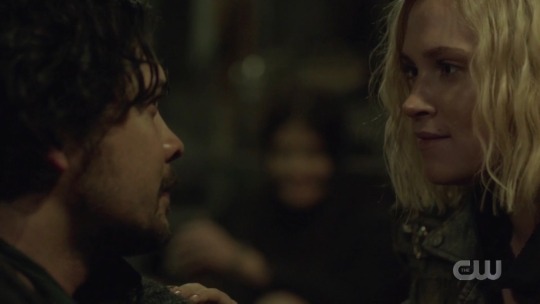
6x12 “Adjustment Protocol”
[a.k.a. “I left them.” + “What took you so long?”]
Though this was definitely more of a fast-paced, plot-driven episode, the flashes of Bellarke peppered throughout are very telling, teeing up a major emotional moment for them in 6x13. While waiting for Clarke to shut down the shield, Bellamy is once again plagued by guilt for leaving his people behind without a second thought. Octavia’s verbal consolations do little to ease his mind, which goes to show how tormented he is by his actions. He genuinely believes dropping everything to save Clarke was a selfish decision on his part because he couldn’t bear to live without her. It wasn’t so much about Clarke needing Bellamy than it was about Bellamy needing Clarke.
He needs her. Not just as a co-leader, not just as a partner. Bellamy needs Clarke. His person. Never mind that his people may need him. If Clarke’s in trouble, he’ll go through hell and back to save her.
Pivot to the Becho reunion. Bellamy’s just been reunited with his girlfriend, the person he’d entrusted to protect his people while he went off to galavant around the woods with J!Clarke. The pure relief on his face upon being reassured that Echo okay is apparent. He left her behind, she was in trouble, but now she’s okay. He’s comforted by her presence in the same way that he’s comforted by the knowledge that a member of his family is safe.
But that look on Bellamy’s face when his eyes meet Clarke’s and everything around them seems to melt away? That’s more than relief. That’s yearning. That’s devotion. That’s “You came through. I knew you would.” That’s love.
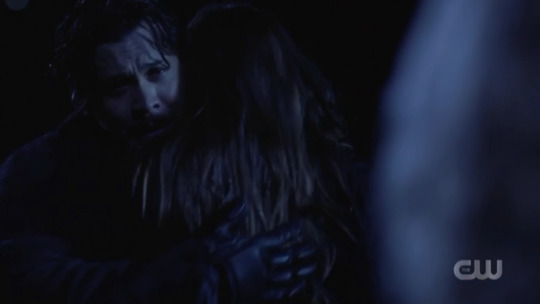
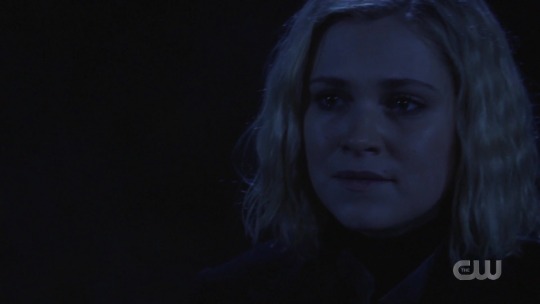
690 notes
·
View notes
Text
Continuing Thoughts on Age of Calamity: I am about 19 hours in at this point and oh man are things going down. Just wanted to record some of my thoughts, theories, reactions, etc... before I get to the last four missions of the story because I’m just thinking about this non-stop and want to share.
Spoilers below the read more, so don’t read if you plan on playing the game. It is a lot more fun to experience in the game than reading it, so just you know, don’t read it.
THE NEW BOTW CHAMPIONS ARE HERE, THE OG CHAMPIONS ARE ALIVE!
-After the siege of the castle mission that ends with the king's death at the hands of the guardians off screen and the menu music changing to the awesome dark theme and the prompt on the screen saying that Mipha, Daruk, Revali, and Urbosa are trapped in the Divine Beasts, I legitimately cried a little bit. Like I was mostly tearing up because of the bit with Zelda and her father and Link dragging her away, but with the context of BOTW and the Divine Beasts and the Champions having been killed in battle with the Calamity Blights, I was like holy crap, they killed them, they're trapped because they died, but then I started the next chapter and decided to do Urbosa and Revali's first and then it starts and they're both still alive and then we see that Teba and Riju come through and like I lost my shit. I was like WHAT!? IS!? HAPPENING?! I thought that it was a really cool way to get more characters to play as (because this is a Warriors game so the vast array of characters to play as is a selling point) and a cool way to keep the OG Champions from being dead which is depressing. So I got Urbosa and Revali back and then realized what this meant for the other mission, that Mipha would be saved by giant grown Sidon and it was just as cute and sweet as I thought it was going to be. And then them working together on the Divine Beast and teaming up and you can see how much Sidon missed his sister and looks up to her, despite the fact that he is literally ginormous and she is a tiny little thing. It made me tear up. The other champion relationships don't really hit that hard because none of them actually met each other before, but it was pretty funny the bit with Teba and Revali when Revali is once again being an asshole to Link and Teba is just like.... WTF? This is the Rito champion, he's like kind of a di- and Urbosa is like yes, we know. Moving on. Because like damn, they really turned Revali's dick factor way up in this game. Like seriously, bird, can you like chill?
-Anyways, another thing that got me going literally insane was the bit in Hyrule field with Astor and Sooga and Kohga when Astor was like...pulling soul power or something from the Yiga soldiers and like turned it into Hollow Link and when I saw that I was like losing my mind. I don't know why it got me so hyped up, but it did and I'm very excited to battle it out with this dark Link character.
-I just finished the battle at Akkala citadel, which was a pretty cool fight, and going to go into the next battle, something about thunder, so obviously another Divine Beast lead in with Divine Beast support trying to fight off Guardians and monsters and stuff. From the placement, it appears like it'll be near Hateno, and will be involving Urbosa and Vah Nahboris. I don't really care for the Divine Beast levels. They are frustrating to control and the camera movements are annoying and the targeting system just is frustrating. The level with Vah Rudania fighting off the guardians was so annoying, just trying to target the guardians and move around and then I just kept getting stuck on the walls and stuff and the movements are so slow, and it was just like, I don't really care for this at all, thanks... I much prefer the on the ground, quick fighting. Obviously, Link is the most intuitive and easiest to use, he's the highest level, and he's the main fighting character, so he's my favorite to use. I really want to unlock the Hyrule Warriors armor set, so I'm going to have to do a ton of quests and stuff which is a lot, but it will make me keep playing the game for a while, which is good since the game cost sixty dollars. It's fun to play though, so I feel like it's worth it. -Regarding the timeline pieces, I'm really conflicted about the backstory elements that we're getting, and I realize that the moment the eggo was introduced, it set this timeline off into a completely different direction, but it brings up questions for me about the original timeline. We don't really know exactly when the Hyrule Warriors timeline starts out and how far from the Calamity attack it was in the past. I would assume that it wasn't too far in the past, most like like less than a year, maybe less than six months? It's difficult to tell because we don't get a whole lot of context. We are given the information that in this game, the Calamity attack on the castle happens at the same time as in the original timeline, on Zelda's 17th birthday, maybe a little sooner, since in the OG, she's coming down from Lanayru with Link and in this one, I think she's leaving the castle to go to Lanayru when the attack happens. But when did everything else happen? How long has Link had the Master sword and been the chosen knight? He's been following Zelda in this timeline since eggo was introduced, but he was still "just a knight" at that point, even if he was a really good and talented one. But wouldn't that mean that he activates his power in Korok forest like barely anytime before the Calamity attack? I mean I guess in the OG timeline, we can kind of get hints that Link hasn't been chosen for a super long time, since Zelda questions him about how confident he is with the Master Sword and can he hear the voice, and is a bit more antagonistic with him, so he probably hadn't been doing that for a super long time either, but it does feel like he's had it longer in the OG timeline memories compared to here when he gets the Master sword and then like two missions later Ganon is popping up at the castle. I mean, it wouldn't make sense really to drag things out a super long time, so I understand that having a bunch of extra cut scenes and missions that aren't super plot relevant would be kind of weird, especially with this Astor dude's involvement, he would want to push things along. But the Ganon attack still happens the same time as the OG timeline, so all of these things happen within the same amount of time. I don't remember in the OG timeline if we ever got any details about how Link awakened his power. I do like how they did it in this version, how it was like a parallel to how Zelda awakened her power protecting Link, which gave me all the Zelink feels, but I just want canon backstory for the OG timeline, you know? We know that this timeline isn't canon for the OG timeline because of eggo being involved, so we can only really pull character elements from this timeline rather than specific plot elements. I also wondered about Impa since she is there kind of escorting Zelda in most of the missions, but was only in BOTW as an old lady, which is fine because they likely hadn't have developed that into the story at that point, but I also think maybe since Link in AOC hasn't become the chosen knight until later, he wasn't seen as capable or trustworthy enough to be her sole escort knight and wanted to keep Impa around for additional protection or something. I don't know, doesn't make a whole lot of sense, but whatever. I'm also trying to remember... when did the Champions get their champion clothes? Does Link have the blue tunic on in all the memories? I'm pretty sure that one of the first memories is that depressing one where Zelda is like knighting Link or something in the gazebo thing in front of the castle, but I can't remember the order... It's just all so confusing and I'm sure I'm deeply overthinking everything and that they're kind of just like retconning elements, but like what does it all mean? I mean maybe... maybe... since Zelda remembers the eggo in her like baby dream memory in that one cut scene, maybe that means eggo was also sent way back in time to the beginning of her life, so this timeline is deeply changed from the beginning of her life, so while the initial difference weren't super evident, just some small things, once they got to later in the timeline and all the Master sword/Champion stuff, it really just like threw everything in the air. I don't know why it bothers me so much, I think it's just me Zelink heart wanting Link and Zelda to have more time together when it's not just crazy monster fighting sad Zelda all the time like in the AOC cutscenes. In BOTW, we get these soft little memories of Zelda and Link researching in the field and riding horses and stuff and like yes the ever present concern about Zelda's power and Ganon is there in the memories still, but it feels more intimate and slow and down to earth. I think it's also because in several of the memories, it's just them two, and in AOC, there hasn't really been any memories with just the two of them together, so it has a different feel to it. I liked in BOTW, the stories in Zelda's diary about talking to Link about his destiny and why he doesn't talk and how he feels the weight of this title and it keeps him silent and it gave Link this interesting depth and emotion that you couldn't really see without that, and then in the AOC, there are some little moments where you see Link having a scrap of emotion, tiny smiles he gives to Zelda, serious face, confused, happy to eat stuff, but most of his moments are the little grunts and blank stares that he gives. Like seriously? Zelda's father just died, she feels like it's all her fault and Link's response is a tiny smile and a "huh". Like yes, there are dynamics with them, she's a princess, he's a knight, he's protective of her and doesn't push her boundaries or whatever, but like just hug please. I loved that memory in the forest in BOTW where she just collapses into his chest and he holds her and we see this pained expression on his face and it's like yes please give me more not lobotomized Link. Like I know this sounds like complaining, because it is, and like I do understand they want Link to kind of be this blank slate, character insert type of character, but give him something please!
-I'm hoping we get some good content in these last few mission cut scenes. I'm getting down to the last few missions, only four left, and looking at the chapter titles, which is the only spoilers that I have allowed myself, I'm like, okay, what is going to happen next. And like I'm going to go out on a limb here and say that we win and the bad BOTW timeline ending is subverted and Ganon has to go night night, but like who knows, maybe they'll surprise me, but probably not. This is supposed to be a game that you keep playing after you finish the main story, so like killing off a bunch of playable characters and having it end in destruction would be probably not so smart...
-Okay, that's all my current thoughts. I'll be playing more tonight and we'll see if I finish the story tonight, or maybe I'll have to stop myself and take a breather before blasting through the remaining missions. I finished I think three missions(?) last night, and I had a break for dinner, but like I don't work tomorrow, so like, I could probably blast through the last ones, but I'd also still need to do some additional quest stuff in between for level up purposes since I just go through rupees like crazy. Oh my gosh, that reminds me... it is so dang annoying when you get one of those like quest find item marker things that lights up when you have all the items and you're like sweet I'll complete this and as you're pressing the button, out of habit, without super paying attention, you realize it's going to cost like 2,000 rupees or something and it's like... not again! I can't tell you how many times I have done this and it's so annoying. Like warn me if I have to pay rupees, I don't want to use my brain, game! Lol yes, it's my fault, I'm not really mad.
-Okay, the end. For now. TLDR: This game is fun and unexpected, but it is also not BOTW, so don't go into this expecting BOTW mechanics or gameplay. But hey, smashing through tons of enemies is also kind of satisfying too. Also, like the new enemies are wild. Elemental Moblins, Hinoxs, Lynels, Guardians(!), the use of the Elemental weapons is a cool mechanic, and it's cool having some cinematic fight moments, even if it might get repetitive after playing the game for a while, but you also can use a ton of different characters, so there's variety there, I just have yet to leave my boy because he's the easiest to blast through anything and everything, though Impa is pretty cool too, even if most of my moves with her are random button smashes since I don't really have a good grip on how her moves work. At least with Link it's pretty obvious and I've gotten better about actually having some sort of strategy with how he works, the other characters I haven't played enough to have any sort of knowledge on how they work. Also Zelda's moves are not fun to play at all, sorry, but they're just annoying and useless. Also Daruk is bad at fighting Hinoxes. Okay, now, the end.
2 notes
·
View notes
Note
hi! i was wondering if you can explain a bit more about why jeong-sun sent yoongi a picture of herself in pillow talk? i've re-read it a couple of times but still not sure if i understand, especially because she felt so embarrassed afterwards? thanks!
Hi, yes of course.
First of all, I guess there are quite a lot of strong parallels between Pillow Talk and Yoongi and Jeong-sun’s part in ‘They make a sex/intimate tape’ which is set almost four years before. In Pillow Talk, they seem to both home in on the events of that fic when talking about their past together because it was the first time when they both realised they loved each other, but couldn’t yet bring themselves to say it as well as being the first time they had seen each other in 2 months since he had been on tour. There were a lot of little moments in that fic which could possibly be seen on the surface as smutty, but were ways of them showing and expressing their feelings for each other (and trying to handle and come to terms with that emotion within themselves. While I think they had both been ‘in love’ before with other partners, neither had ever quite felt like they do for each other, and I think they both felt really unexpectedly taken aback by how intense that emotion was).
For example, her telling him via text ‘I need to see it. Please.’ and him in return sending her a picture of him holding himself was one of those moments that held a lot of meaning in the moment because I don’t think he’s someone who would ever usually send a girlfriend a dick pic, even if it was solicited, and she’s not someone who would usually ask for one. I think the complete trust between them at that point was clear from both ends, and they both recognised they had more to say to each other on the phone but couldn’t bring themselves to say it with so many miles between them. In addition, we think when he looks at her and whispers ‘ride me’ later in the fic is a really beautiful moment, which could almost be read as him asking her to make love to him.
Going forward, I often think of Pillow Talk as being one of their most intense and intimate sex scenes, without any sex having actually taken place. It’s probably our best example of how Yoongi and Jeong-sun can ‘make love’ to each other through their words and dialogue, without it being ‘dirty talk’. The morning after (and this is the first time they have slept together in the same bed/spent all night together in three years), I think they both just feel so elated and don’t really know what to do with themselves, and need to take a step back for a moment to come to terms with what had just happened and what it means for them.
In the same way that Yoongi showed her his feelings years before through the picture, in the moment she feels the need to show him how intensely she feels for him. On the surface it’s crass, and she’s certainly feeling worked up (emotionally, if not quite sexually) and not quite thinking straight. I’d describe how they both feel when they separate after having kissed again for the first time since their break up as being like if you drink a ton of energy drinks or coffee - just really buzzed and a bit agitated and restless. She knows it’s going to be something she is going to feel embarrassed about after, but in the moment doesn’t really care. I also think she knows Yoongi will recognise it for what it is, which he does (and he also knows her well enough to know she’d feel embarrassed about it after, so while receiving it would have undoubtedly made him feel breathless, he deletes it almost straight away).
I hope this makes sense, but please feel free to ask more about this or other moments, and I’ll try to clear it up :) Obviously, everything can be interpreted by readers in its own way and we love hearing how people feel about certain situations/their thoughts.
- Admin M
#bts#bts suga#suga#bts scenarios#bts smut#yoongi#bts x oc#bts girlfriends#bts relationships#bts ships#bts ask#bts asks#bts ask us anything#bts ask me anything#min yoongi#suga x oc#Suga x jeong-sun#Yoongi x jeong-sun#ask#asks#bts lemon#bts fics#bts fan fiction#bts questions#bts fanfiction#bts yoongi#bts min yoongi#bangtan sonyeondan#kpop scenarios#k-pop
7 notes
·
View notes
Text
AWAE 1x5 rewatch: thoughts and reactions
Here I am again with another AWAE rewatch. Writing these takes longer than you might think, so I don’t know how regular I can keep those coming, but I’ll see what I can do. For the time being, let’s dive into another episode:
And this episode opens in the best way possible - with Shirbert’s first spelling scene. Little did we know how important those would become - although reading the books kind of gave us a hint of it. And yet, this is one of the added charms of this incarnation of the story.
I have to say Mr. Philips is not being subtle with the words he is giving them to spell.
And there goes Gilbert’s first skipped E - in the word engagement, no less. That letter was given a lot more emphasis here than in the source material, and I live for it.
“Anne, are you feeling alright?” Knowing what milestone Anne experiences later on in this episode, Anne’s discomposure probably has little to do with Gilbert’s effect on her. But who can ever know for sure? I have to say, this episode had one of the cold opens I call “gold opens”.
And there it goes - Anne’s dramatic reaction to her first period. Is this an appropriate time to complain about the lack of health ed kids get in this setting? I mean, she would not have reacted like this if she had been talked to about this and knew what to expect. I doubt anyone’s reaction would be any different if they didn’t know what periods were, woke up in pain one night and discovered they were bleeding. Also, Anne better not be soaking that thing in hot water, or else the stain is never coming out.
Anne’s “I’m not ready to be a woman” speaks so much to me. WARNING: intimate personal experience coming up. I remember my first period. I had just turned fourteen about a month prior, and I had pretty much stopped anxiously awaiting it after I had done so since they talked about it in health class when I was 12. So, when I went into school for a test one day 6 years ago - I was really sick so I only went in for the test in the middle of the school day - I was focusing on the material and on suppressing my sneezes so I wouldn’t spread the flu to others. I was not at all expecting to go into that test a girl and come back home a woman. Yes, I was in pain, but I thought it was the usual stress pains I would get during important tests amplified by my sickness. Anyway, so after that day, for years after, I would cry when I got my period and insist that “I am not a woman, I do not need this” and this emotion was so strong in me that it would result in progesterone deficiency and my period would skip for months and I would be on meds for so long. Then, when I was 17, I talked to a therapist about this and it turned out my refusing to accept I was a woman (as opposed to a girl, not that I was questioning my gender) was making my body try to suppress my womanhood. So yeah, it was tough. But I’m ok now and Anne’s reaction just brought out this personal memory. I’m sorry. Maybe I didn’t need to tell you all this, but it’s closely tied to my reception of this episode, so the way I see it I couldn’t go without it.
The way Marilla shooed Matthew out made me think. Was the existence of periods supposed to be kept a total secret from men at the time? Because that is not ok. Even today, there are a lot of men in the world, probably the majority of them, who don’t know the simplest thing about periods.Those are men who have mothers, sisters, girlfriends, daughters - they interact with women close to them and they at least need to know what to do and what not to do to make that time of the month easier for the women in their lives. But they don’t because nobody teaches them. This is just another part of making periods seem like a shameful thing that is to be kept secret at all times. And that’s not ok. But we’ll get back to that in future scenes.
While Anne is turning into a woman physically, Gilbert has to grow up too fast in a different way. What he has to go through with, and then without his father is just heartbreaking. Getting your period is a good and healthy, if unpleasant, way to grow up; losing your father - just the opposite.
Marilla cracks me up. “That explains all the children” is her hilariously deadpan response to Rachel saying she’d rather be pregnant. And I’m glad to see both women find it as hilarious as I do.
I’m even happier to see the girls at school are laughing together, too. However, things get serious quite suddenly. Apparently, Anne has just told them about her new maturity, so now they’re all sharing their experience. However, Ruby reminds me a lot of me in the same situation. Remember that health class I had when I was 12? It provoked a lot of discussion among us girls afterwards, and that was incredibly awkward for me because I was apparently the only one who didn’t have it yet. So yeah, I was Ruby in this situation, but I would go on to become Anne saying “Trust me, if I could give you mine, I would.” It reminds me of another personal story, and you’ll have to excuse me for telling it. A lot of my personal stories are coming out here, but I guess it’s the topic of the episode and there’s no way for me to comment on it without relating those stories. So, about a year ago when my 11yo cousin told me she’d gotten hers, I was in another one of my so-called “period-less periods” and I was seriously worried about my health. So, naturally, I was like “If I could take yours, I would.” Because, you know, it’s normal if you don’t have it at 11, but it is seriously concerning if you’re a 19-year old virgin going two months without her period. So, you see, I’ve been at so many points within the spectrum. Well, I’ll try to comment only on the episode from here on and not share my entire medical past.
“Nice boys never say people eat insects”. I quote that pretty much on a daily basis - every time someone mentions mnemonic devices. It’s hilarious. One of my university professors went out of her way to say those two words as many times as she could one time last year and I could not contain my laughter thinking of this quote, courtesy of Gilbert Blythe.
Anne acts just the way I do on my period - ok, I said no more personal details, but that barely counts. It’s just, Anne is so relatable. But also, when she says “Nothing appeals to me, Marilla” - I know what you need, Anne. You need chocolate. But did they have chocolate like we do?
My, I had forgotten this was when the raspberry cordial incident happens. This should be fun. And then heartbreaking. But it’s kinda fun in the long run, you know.
Wait, is Matthew going to order a puff sleeved dress for Anne? Is this that? I mean, it has to be since he rarely leaves Green Gables unless it’s for something really important. And if this is important to Anne, then you bet it’s also important to Matthew. You gotta love that man.
Of course Anne would be wearing the special ribbon Marilla Gave her. And of course she would invest all of her energy into that tea party. This is beautiful. Too bad one little mistake will have to ruin things...
Matthew is visibly uncomfortable amid the crowd in town, but he’s doing this for Anne and that means he has to do it, even if it’s out of his comfort zone. Even if Marilla might disapprove. The world needs more men like Matthew Cuthbert.
If Diana’s family had seen the manner in which Anne welcomed her to tea, they might have disregarded her mistake at the end, but alas, they didn’t. It was as classy and sophisticated as could be. The end was an innocent mistake.
Ok, but how funny would it be if the first bottle Anne picked up was actually the cordial she was looking for? That was kinda like putting down the correct answer on a test, then correcting it to the wrong one. I know I said it’s funny, but now that I put it like this, it’s just as upsetting as it has always seemed to me.
“Will you take me with you, you have to take me”... imagine Anne at finishing school. Just imagine.
Ah, yes, alcohol brings out the immature side of even the most dignified young ladies. There’s nothing like seeing Diana Barry, the poster girl for classy, shouting “Bosoms!” and giggling with her best friend. Her highly controlled young life finally saw a moment of blissful immaturity. What a pity it will end in tears.
I see Matthew has finally opened up - and of course he has, he is talking about Anne. He just loves her so much. Ever since I was first introduced to the books, I’ve always thought it’s such a wonderful mistake that Anne ended up with the Cuthberts. It made life better for them as well as for her.
Little Matthew reminds me a little bit of Cole - quiet and gentle, but, as Jeannie said, knows how to “make himself known”. And also I love them both with all my heart.
Oh my, so this is the reason Matthew had to leave school - because Michael passed away? I had forgotten. Well, thanks for breaking my heart a second time. But well, I brought this upon myself by deciding to rewatch the entire series.
“A dignified affair”... if Marilla could see them now. Well, it’s better off that she can’t yet. Things are going down as it is, just let the fun last a little longer.
And there we go. It’s like the whole world is falling apart. This is worse than that time in season 3 when Diana’s mother drags her away from the Baynard house. And both times it is just plain tragic because both Anne and the Baynards are beautiful, good people who are nothing but kind and loving to Diana, and yet her mother fails to see that anything else but what she has deemed appropriate for her daughter, can be good.
If Marilla thinks some pairs of boots are “a frivolous expense”, I can’t imagine how she would react to the dress Matthew ordered for Anne.
“I will never have another bosom friend” Well, no, you won’t have to, Diana. It might seem like it’s the end of the world now, but it won’t last. Then, of course, there will be that other time of separation, which, like the other parallel I drew regarding Diana’s mother forbidding her to fraternise with someone, has to do with Jerry. I don’t want to think about that one, but, you know - just like this one, that, too, was fixed within the next episode. Also, based on this scene, I totally see why people ship them. I mean, it lowkey reminds me of Rapunzel and Cass in the TTS finale. You should watch that show if you haven’t btw.
Yes, Anne, life is so unfair, but not to you right now. To Gilbert. He’s losing his father. Forever. You just lost a friend for a little while. But of course, Anne knows neither one of those things. Life really is unfair, isn’t it?
“What wonderful red hair”, “I’ve heard nice things about you.” These must be some of the nicest things an adult who is not Matthew or Marilla has said to Anne in a long while. I wonder how that made her feel. If I were Anne, Gilbert’s father would have just made my day.
“Give my kind regards to Marilla” These words, coming from John Blythe, mean more than Anne and Gilbert can imagine. They mean more to me now that I’m watching this episode for the second time. That is why I love rewatches.
“Fair and square” Another Shirbert moment that would go on to become iconic. In a way, this whole episode is.
I see that, for once, Anne is putting her heart into her needlepoint. And not just hers, but, as it seems, Diana’s, too. She’s literally embroidered the words “kindred spirits” between two connected hearts. It’s beautiful. And sad to think that, as far as they know, they can never speak to each other again.
“I’ve come to realise that there are far bigger worries in the world” - is Anne referring to what Gilbert is going through with his father? Probably. I mean, being an orphan and going from one abusive household to another, Anne has probably never really had a relative to worry about. So she likely never even thought about how Gilbert feels taking care of his ill father until she saw it with her own eyes. This is why she won’t know how to properly react when John Blythe is gone.
So, I was wondering what Jerry’s role in this very much iconic episode would be, and there it is - he will be the one to take the boots back and bring home Anne’s special dress. And return the button to Jeannie, of course. This is definitely a special part. And Jerry delivered - both figuratively and literally in this particular case.
Anne’s face seeing the big box on her bed is priceless. The moment she sees the dress inside - even more so. What is a moment of “frivolous expense” and “vanity” to see her dream come true. And, just like that, the Cuthberts are a happy family.
In this episode, we saw: Shirbert’s first spell-off with Gilbert’s first skipped E; Anne’s first period, commented on with a lot of personal details about mine; a memorable mnemonic device; the development of John Blythe’s illness; a sassy Marilla moment and the reason behind all of Rachel Lynde’s pregnancies; Matthew orders a puff sleeved dress for Anne and is reunited with an old... friend in the process; Anne invites Diana to tea with disastrous results; the (temporary) tragic end of a beautiful friendship; Anne is older and wiser; Jerry delivers an important package; a happy ending to a tough week for Anne.
#anne with an e#anne with an e season 1#awae#awae season 1#renew anne with an e#renew awae#jnk watches awae#anne shirley cuthbert#gilbert blythe#diana barry#jerry baynard#matthew cuthbert#marilla cuthbert#rachel lynde#ruby gillis#jane andrews#josie pye#tillie boulter#in matthew we trust
17 notes
·
View notes
Note
If the MC from rmd was more mature and if rmd wasn't a love choice story with less episodes, would it be better? Or is there more stuff that needs changes?
yeah i do think so! so i think they tried to emulate hlitf (and mpd maybe? i’m not familiar enough with mpd to be able to say). in thinking about rmd and its future (in response to another ask which i’m still working on bc i lost my whole essay the other day lmao), i kind of theorise that they wanted rmd to be the next Big Title with a full lineup of “ensemble cast” type characters, instructor-student type dynamic (which can then ‘progress’ to colleague level), lots of lore/backstory, potential for lots of substories. the backlash against love choice has been strong in both japanese and international fandom as far as i know so i really think that was a big hindrance in terms of drumming up success for a title that is set up to have a LOT of content. hlitf has always had a leg up bc from the start, it rode off the success of msb and the demand for more public safety content, which is why right from the very start, they tried to push crossovers with hlitf/mpd. the very first rmd substory is a takado/kirisawa crossover, and then they had that extremely gratuitous cameo in ayumu (aka voltage’s king) season 3 in both the ms AND his pov. they keep pushing these crossovers, like with the vip room event which just came to love 365.
ANYWAY, the more i think about it, the more i’m convinced that they’re trying to emulate some of the successes of hlitf, so i find it a pretty useful point of comparison to see the things which i find are lacking in rmd.
so yes i definitely think that i wish the rmd mc was more vulnerable and maybe more romantically inclined and just generally more emotionally mature? i’ve said i wish she made more mistakes but i when i think about it more, i do see some parallels between dr mc and hlitf season 1 mc in that they go into a new learning environment with a certain set of values that get challenged. so i am willing to acquiesce on that point i’ve made before about her errors, since i do think that her values and the choices she makes because of those values get called into question (coming off the back of reading matsunaga’s routes, i do see this happen). also i’ve said this before but just to reiterate, i do also think that there’s a tone shift in the translation that to my perception (re-?)characterises the mc as being blase which i feel comes at the expense of genuine emotional connection between the reader and the heroine. however, i do also think that this tone perception thing is very subjective bc it reads as being quite american to me which is something that (1) is foreign to me as a non-american and (2) gives me a feeling of incongruence bc i’m very aware that this is japanese media. either way, i think in a long form title, there is potential for her to grow/develop when it comes to emotional maturity and romantic development, which leads me to my second point...
ANYWAY, the biggest (writing) issue that i find with rmd is its lack of romance FOR SUCH A LONG ROUTE. generally the main point of otome games is the romantic aspect, which i find to be super lacking in a game where romance is literally right there in the title. so one of my favourite things about hlitf is that we have the whole “meeting him” route before the “falling in love” route, and that generally each season is split into two halves in which the first half feels complete as a route on its own, but its strengths in setting up plot and character/relationship development become highlighted in the second half of the season (i know i talk about this a lot but kaga’s season 2 is the PRIME example of this). hlitf’s “meeting him” stories all tend to have abysmal ratings (which.... i pretend i do not see it) because of people not getting that they’re just introducing the characters and setting up their dynamic first. because of this, we essentially get a (relatively) slow burn romance that takes 20 chapters (or in tsugaru’s case.... 60 chapters lmao, or we’ll say 30 bc he has shorter chapters) to get to fruition.
so romance md has 30 chapters to get the job done, which SHOULD mean that there should be better pacing to get to the relationship stage, right? rmd does a similar thing to hlitf’s split routes where there’s generally one “introductory” case which introduces a moral dilemma, which then ties into a second case. in hlitf, the introductory case in ms1 serves to introduce us to the love interest’s personality and way of working as well as helping the two characters become closer by spending more time together. then it links to ms2 in that it tends to lead into wider criminal activity that may or may not be related to the love interest’s primary negative characteristics, and most importantly, the mc is instrumental in helping the LI overcome that issue (e.g. goto’s paranoia about losing colleagues/partners, kaga’s problems with internal corruption within the NPA, soma’s trust issues and devaluing of those around him, ayumu’s unrequited love). so let’s say that a full rmd route is equivalent to ms1+ms2 in hlitf.
rmd does a very similar thing in terms of plot structure with the main difference being that the medical cases tend to align explicitly with the LIs’ traumatic pasts, where in hlitf it’s a bit more indirect (only goto and soma have had their primary vengeance arcs complete). so why does the pacing feel so off? i think that the reason for that is that there is just so little energy put into romantic development. one thing to note is that the mc has already fallen by episode 10 of ms1, i.e. halfway through the ‘full’ route. the only rmd route that i’ve read where the mc has already caught feelings at that point is hosho’s route, where she realises in chapter 15 (which is why i did write in my review that i thought the pacing was better). secondly, it’s a LOT harder in rmd to see not just the mc’s feelings developing, but the progression of the love interest’s feelings. imo this is because they basically treat her uhhhh the same from start to finish??? she runs her mouth from day one and even during very intimate conversations, so i feel like there is no sense of increasing emotional closeness - it’s more just that we (the third person reader) get to know more about the love interest’s past and i guess we see them becoming friends? rather than seeing two people growing closer with romantic attraction. contrast this with hlitf, where they were never ‘friendly’ and the relationship that starts blossoming between them was always overtly special and romantic relationship and the way in which the love interest softens for his mc is already evident by the end of ms1. this means that we get a whole 10 more chapters for this development to really take its time to get to where it needs to go. this also means that we actually see obvious burgeoning attraction (or special treatment) before we get to any sort of climax confession scene. i feel like the mc’s lack of manners/impertinence familiarity with the LIs from the very start means that it’s a lot harder to see the dynamic between the two of them changing. just compare the way that dr mc and takado talk to each other in ch1 and ch29 vs the way that hlitf mc and kaga talk to each other in ms1 ch 1 and ms2 ch 8. i would argue that the action scene in the collapsing building in takado’s chapter TWENTY SEVEN is about equivalent to the action climax scenes that happen in hlitf ms1 chapter NINE.
(oh and i also think that the whole talking about how physically beautifully they are to their faces from day one also hinders the sense of growing mutual attraction.)
another GIANT hindrance is that a lot of the key bonding moments are actually paywalled behind heart scenes so you really don’t get anything if you don’t dish out THANKS LOVE CHOICE.
anyway, long story short is that romance md spends waaay too long and focusses way too much on plot stuff and character backstory (if you can even unlock it lmao) and leaves maybe 5% at the very end for romance rather than having a romantic element integrated throughout the story. if i were to try and compare it to hlitf again, i would say that to me, rmd routes feel like if hlitf ms1 was as it is but then there was one extra chapter at the end where it just goes straight to confession without the entirety of ms2′s development. but also like at least 2x longer. like imagine if we had ms1 and ms2 but there was no romantic engagement or indication of any romantic interest from the love interest in 20 whole chapters except you suddenly get one confession but only in the happy ending. actually matsunaga’s doctor ending literally FLOORED me like ???????? it’s literally like imagine if you only got through namba’s ms1 and half of ms2 (to that scene outside the dorms when you know what happens) and THAT’S WHERE IT ENDS LASKDJFLKSJ they finally had some early emotional awareness on the part of the mc and then they had to go and make it ENTIRELY one sided with not just zero but actually NEGATIVE romantic intention from the love interest i’m screaming
tl;dr: my biggest problem with romance md is that it’s literally SO LONG but there’s no romance
#wow i promise i did not intend to write this much but it all just came out#this took me a whole day to write too lmao thanks adhd!!!!#romance md: always on call#rmadoc#romance md#her love in the force#hlitf#voltage inc#otome romance#love choice#love 365#meta#Anonymous#snow answers
3 notes
·
View notes
Note
Do you think bellarke not being “confirmed” (like a kiss or a confession) by the end of the series is bad writing/disrespectful to fans? I can appreciate the story without a confirmation but I feel like they almost owe the audience this? Idk what’s your take on this
My take on this is part of why I’m struggling with being part of the 100 fandom right now. The 100 does not owe you confirmation of your ship. They are telling the story of Bellarke, but what they decide Bellarke to be is up to them. If you want to watch the story of Bellarke, it’s up to you to actually PAY ATTENTION TO THE STORY OF BELLARKE, not make up your own.
Everyone seems to feel that they are being disrespected by the show telling the story of the show. And I have a problem with this. I feel like the fandom is disrespecting the story by not letting it BE the story it is. I’m the first person to say that this IS the story of Bellarke, this is what we’ve been watching all this time and they have NOT betrayed that. They have continued to tell Bellarke for 6 seasons and every season they have gotten closer and deeper and more intimate and more epic. The love story that IS Bellarke is far more beautiful to me than what the fandom is demanding. If the story had pulled away from Bellarke at any point, I might have said that it was not going there. That they changed their minds or I was wrong. But it’s not. Every season the Bellarke love gets MORE. And every season when I see who they are at the end, I think it is more beautiful and more intense, even when it is also painful.
If this were a romance genre show, which requires, as part of its genre, that there be a HEA (happy ever after) where the love interests get together, then NOT getting together is a betrayal of the genre/audience/expectations. Although I’d like everyone to remember that Pride and Prejudice never had Elizabeth and Darcy get together, and the first confession resulted in an ABSOLUTE DESTRUCTION of the romance relationship and it wasn’t until the very last scene that we got a marriage proposal and acceptance.
As this is NOT a romance genre show, and is instead a post apocalyptic science fiction action survival show.... a HEA is NOT a requirement.
HOW they define Bellarke is UP TO THEM. What the endgame is IS UP TO THEM. Romance can definitely be an element of post apocalyptic science fiction survival shows, but the expectations are not the same for the genre. With the mythic and tragic element to this story, a HEA is ABSOLUTELY NOT GUARANTEED. And for the fandom to require it is an imposition on their part. Sorry.
We as the fandom don’t get to decide for them how this story should end. And to think we do is rather offensive. Do you know? That’s where I think the disrespect is. When someone is telling a story, you let them tell it. You don’t demand your version.
Maybe people consider this perspective to be old fashioned, but this is my belief. Everyone should get the chance to TELL THEIR STORY. And this is what I want to encourage. it’s one of the reasons I love fanfiction because it’s a freedom to write your own story and tell your perspective and desires and fears. The more people who tell their story, the more perspectives we get. And I would defend the right of EVERYONE from beginning teen age writer to broadcast show runner.
The flip side of the directive to TELL YOUR OWN STORY is that we need to have an audience that listens when people tell their own story, because otherwise what’s the point? It’s not just about seeing yourself in the stories, it is ALSO about learning about other people’s stories, listening when people tell their version of the world. Sharing. being open to other perspective. So that means the flip side is LISTEN TO THEIR STORY.
When I listen to the story of The 100, and the bellarke story within The 100 story, I do not see a story that is missing anything. I do not see a story that is a betrayal of the audience, the expectations or itself. I see a story where a kiss or confession is NOT the culmination of their love. He just saved her life with NOTHING but his love. How could you possibly be disappointed by that? How could you feel cheated? I guess because fandom is more interested in romance genre which requires kiss/confess/sex? Or soap operas, which require melodrama in regards to romance and sex everywhere?
Listen. Do I WANT them to kiss? Yes. Of course. Am I frustrated that story goes so slow? Sure. But as I’m watching the show, I can see it is STILL developing and growing and getting deeper. We are not at the endgame. We are building the endgame. I don’t have a guarantee that they will get a HEA. I don’t have a guarantee that it won’t be last minute like P&P. I don’t have a guarantee that their love won’t be tragic and someone sacrifices for the other. I don’t have a guarantee that their love won’t be a particular myth like sun/moon who never get together (although since they are getting closer it would seem that they ARE not in a static orbit but heading for connection, in the case of binary stars I think that might meet in supernova, creation of a new galaxy and all that.)
To top it all off, I don’t like it when people ask me to make judgments on what I haven’t seen yet. And yet, the fandom does that ALL THE TIME. Like, you want me to feel betrayed by an eventuality that hasn’t happened yet and may not ever happened. No wonder you all think JR is your enemy. You’ve got him set up to be betrayer when he hasn’t done anything yet. You’re just PROJECTING that he’ll do that.
I mean, I’ve seen people say he’s just like D&D and will ruin The 100 the way they ruined GOT, but I don’t see that happening. I see resolutions of storylines that pull on the entire history of the show. I see all those parallels as they bring important elements back into play. I see characters working through their trauma and growing stronger.... none of this happened on GOT. Or, it started to and when they got to the end of GRRM’s story, they dropped it all. Which tells us that the structure and meaning of the story was coming from the author while the flash and dazzle was coming from the showrunners. And when they lost the support of the author, their story fell apart. The 100 has been JR’s baby from the start and the story HIS, and he’s refused to allow other people to push him from his story even when it caused problems.
But here’s the thing. If GOT had ended with the same people dead and the same people on the thrones, they COULD have made it a satisfactory ending. There’s no way to tell if it works or doesn’t work until you get the story. They COULD have tied it into the prophecies. They COULD have worked an epic tragedy, instead of dropping character arcs and forcing them to BECOME what they were all fighting against. They could have had them facing their pain and growing, even if they lost. That’s why Lyanna’s story and Theon’s story felt right and Dany’s and Jon’s and Jaime’s stories felt wrong. They could have USED the spirituality and magic they set up for Bran to make him a powerful scary king instead of “weird.” (that’s the worst. he’s not weird. he’s magic. do they even LIKE fantasy?) They could have made Sansa be a STARK instead of turning her into a Cersei-Littlefinger hybrid. Lyanna Mormont was a better Stark than Sansa. BUT THEY DIDN’T. The ending could have worked if they had valued the journey they took us on. THAT’S the betrayal. And the funny thing IS, I got all my endgames on that show. Jon and Dany. Arya and Gendry, Brienne and Jaime... got the kisses. got the sex scenes. got the confirmation. Did that stop them from betraying the audience???? NO. BECAUSE BONING IS NOT STORY.
Bellarke is the STORY of The 100. One of them. And we have not been betrayed. To be honest, I felt more hurt by the finales of seasons 2 and 4 than the finales of seasons 5 and 6 which gave us all the fandom outrage. Because in THE STORY Clarke and Bellamy are TOGETHER, closer and more epic than before. To be honest, they are practically one soul in two bodies at this point... they are being WRITTEN as soulmates. This isn’t just being told to us by word of god, you can SEE it. Clarke lived on, for six years with Bellamy’s soul inside of her. And Bellamy lived on with hers inside of him. And when she was body snatched, Clarke could reach out and contact HIM and when she was murdered inside her mind, he REACHED IN AND PULLED HER OUT.
And y’all are pissed off because Bellamy is still “technically” with someone he can barely have a decent conversation with? And spends no time or energy on?
I can’t listen to the complaining anymore. The story we HAVE is so good. And everyone is like BUT THE BONING!!!! BETRAYAL IS LACK OF BONING!!!!!
We aren’t misinterpreting this story. There are things we are misinterpreting, like the imagined war between Clarke and Spacekru, or Echo being a bad guy. Or Clarke being a bad guy. We’re imagining a shipwar too. B/E vs B/C. That doesn’t exist. Echo and Clarke are not enemies. They are not opposites. They are not good vs evil. Echo doesn’t have to be bad because Bellarke belongs together. B/E isn’t toxic. Taking Josephine into the woods was not a sign that Bellamy turned his back on his people. But we aren’t misinterpreting that Bellarke is the center of the story.
And I’m not going to say the story is betrayed by projecting my own speculation and blaming it on JR. Not sure anyone can tell their own story if we can’t tell the difference between OUR story and someone else’s story.
42 notes
·
View notes
Text
14x13 First-Watch Thoughts: Dean Winchester, John Winchester and Destiel
Before I write a full proper review this weekend (and I plan to write a separate Sam post) (I’ll be missing other key details for sure) let me SCREAM about:
JOHN WINCHESTER FADING AWAY AT THE END OF THE EPISODE LIKE A GHOST INTO THE ETHER as the Winchesters said goodbye to him --> TPTB visually/narratively textualized his ghostly presence like we’ve seen in S13/S14 -- Ghost-Monster-Yeager-Michael epitomized figure. He loomed over Sam and Dean's lives (especially Dean's) as the core toxic remnant of their past that they internalized and which subsequently influenced them to live out their toxic life courses and crippled their healthy self-processes, yet John Winchester’s narrative cathartic (and redemptive) role was fulfilled during Season Who Am I 14.
DEAN: For the longest time I blamed Dad. I blamed Mom too. I was angry. [...] But to be honest I don't know who that Dean Winchester is [re: letting ‘some other poor sons of bitches’ take Sam and Dean’s place if they were normal].
DEAN: I'm good with who I am.
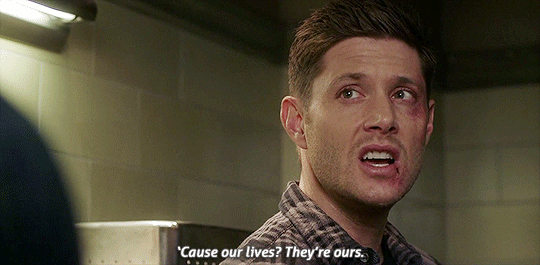
x
Dean ACTUALLY used his words and disclosed the sources of his trauma and parental neglect *screams* He self-introspected during the dishwashing scene in the kitchen -- the Heart and Home -- by precisely doing what we expected/hoped for him (and Sam) to do: reflecting on their current lives in response to 2003!John Winchester’s resurrection and determining what really holds true value and worth...what holds more fulfilling love and true heart’s desires than a pearl ever could --> Found Family. DEAN, recalling that life is short, accepted his current respective life with Cas and Jack and stressed the self-fulfilling importance of why their lives turned out as such. What they went through since Mary died in 1983 moulded them into who they are today. HE ACCEPTS WHO HE IS!! Dean accepts who Sam is. Sam and Dean, as grown men, become the optimum versions of themselves where their physical, emotional and mental suffering was, of course, undeserved, but also ultimate self-cathartic blessings in disguise: it contributed to their both their psychological resistance and individual journeys towards self-actualization as they create interpersonal bonds with others outside themselves. THEY LET GO.
JOHN: I'm so proud of you boys. I love you both...so much.
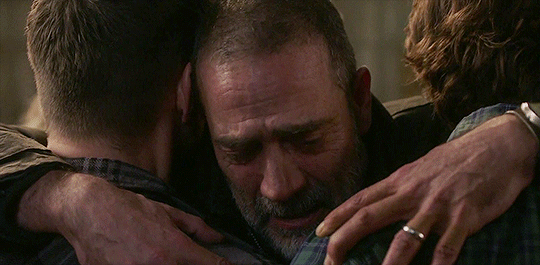

x
THE LONG-WANTED AND LONG-OVERDUE PRIDE AND VERBALIZED LOVE FROM A FATHER WHO ABUSED HIS SONS FOR YEARS. He finally told Sam and Dean that he loved them. He asked for forgiveness, and they freely chose to give it, additionally permitting themselves to embrace cathartic closure. Now THAT is how you transform trauma into your self-motivational strength!! In particular, we knew *points at all the extensive John vs Dean meta* that Dean yearned to hear those direct words from John. He yearned for years. For Dean to hear it spill out of John’s actual lips -- to hear John verbalize how much he loves Dean, how he’s proud of the man he has become -- after everything Dean has done for him -- is sheer meta fulfillment executed in the most emotive way. Instead of watching his son die without fostering altruism e.g. 2x01 In My Time of Dying, we see John watching his son LIVE and grow -- exercising his agency, formulating decisions for himself, and finally discovering SELF-WORTHINESS. SELF-LOVE. SELF-ACCEPTANCE. John also told Dean that he “never meant for this. I guess I hoped that eventually you'll get yourself a normal life. A peaceful life. A family.” Well--
Dean told John he does in fact have a family, topped off with the smile of utter happiness on his face.
He chose his own timeline in which Cas and Jack exist. He chose his Found Family.

x
It’s intriguing to note that, in the context of John hoping Dean would have “eventually” obtained a “normal life” -- a “family” -- for himself, if we go off SPN’s constantly-reiterated narrative differentiations between familial family (brothers) and intimate family (husbands, boyfriends, girlfriend) aka Love and...Love, the unsaid connotation of ROMANTIC family applies here, as @thetwistedwillow and I discussed. Sam is Dean’s family, but John isn’t referring to him.
John is referring to Dean getting himself an Apple Pie Life™ -- one that Dean initially tried with Lisa and Ben Braeden but couldn’t sustain; Dean seeking marital happiness outside The Life™ was NOT personally/characteristically feasible. It entailed burying vital truths about himself -- imprisoning his non-performativity -- as a broken man within a broad illusion of Want vs Need whom Lisa also tried and failed to fix...failed to make whole despite Dean once telling her that she comprised his happiness long ago.
Indeed, the present era of Season Cyclic 14 ushers in truth.
Dean has a family with “someone who understands The Life™.”
This aforementioned Life™ -- regardless of it being full of pain, horror, and death -- offers Dean joy, security, and new beginnings.
Cas and Jack, willingly choosing to incorporate themselves into The Life™, are the mirrors of freedom to Lisa and Ben’s jagged misfortunes.
They accept who Dean is wholeheartedly. They lend him purpose, zeal, and love -- buckets of love. They are aware of his faults. They encourage his strengths. They represent his faith and his hope.
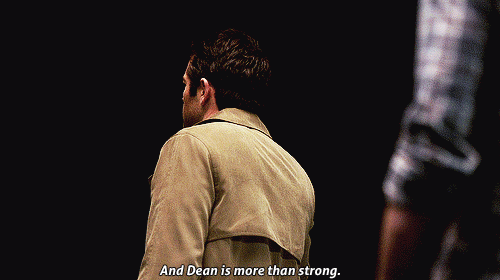
(Cas, more than anyone, is indelibly aware of Dean’s capabilities.)
In terms of communication, Dean told his brother Sam that he loves him in 14x11 [for attempting to find another way re: Michael]. He directly told his mother Mary that he loves her in 12x22. Tonight he finally told his father John that he loves him, too. ALL the emotional honesty and transparency, my friends!!
Who else is left for Dean to say such significant words to? WE JUST DON’T KNOW!
- - - -
14x13 practically crossed off most of this + my entire SPN300 checklist!!!
- CHOSEN FAMILY VS FOUND FAMILY themes - S14 Dean encountering/hearing about the Castiel of Old—the Angel of the Lord who hasn’t yet built a trustful and ever-complex ten-year relationship with him - Sam finally rectifying and clarifying things with John as a grown man!! TPTB know what 14x13’s premise means for Mary Winchester and TFW’s characteristic arcs aka EMOTIONAL CHARACTER-DRIVEN NARRATIVES. They are facing their pasts and must subsequently introspect and FINALLY act upon their WANTS vs NEEDS. Bros (Dean the Emotional Hero of SPN in particular) may have wished John was alive, but is it worth losing Cas and Jack? - Is it worth losing the real Cas Dean knows? Worth replacing the angel who executed his own choice to Fall, embodied his newfound humanized principles and willingly became part of Dean’s life? - (And here the focal point of the Destiel-adjacent 14x13 narrative comes in) If John didn’t die, Dean’s life course progression towards self-actualization (with Cas as a key aspect of his psychological realizations; Dean and Cas as both each other’s offsets to healthy self-process) wouldn’t have happened. Losing Mary—losing John—ALLOWED Dean to, despite all the unfortunate circumstances, endure necessary pain in order to heal…to: A. release himself from the shackles of predeterminism, Brodependency, parental absenteeism, repression, toxic misemotionality, and trauma + eliminating the old perceptions of himself as a blunt tool: his father’s hammer and society’s hammer and B. embrace his reflection that he sees in the mirror of his identity - Is alive!John truly what Dean WANTS? What he NEEDS? Dean and Sam, confronted by personal ultimatum in terms of their individual relationships with John and the psychological states/growth stages his death left him in, must decide! - TL;DR character development - And, of course, proliferation of endgame Destiel in some way (not a BIG way yet, but building blocks) from this point onwards and subtext moving into its final pre-text phase as I hope/expect Dean to choose his reality with Cas
(I’m expanding on the last point in a bit!!)
I have LOTS of additional thoughts (tbh they’re all an incoherent jumble lol), but as of now I’d like to say that nothing else can surpass the heartwarming satisfaction that bloomed in my chest over the way Dabb and Glynn beautifully interweaved the narrative’s Family/Love/Forgiveness/Self themes into an episode full of amusing callbacks e.g. Plucky Pennywhistle’s Magical Menagerie (there were a LOT of easter eggs I tell you) and heavy-weighing characteristic ones e.g. Goodbye Stranger Destiel redux -- and oh my gosh, the Dean and Cas narrative callbacks we received tonight, where Dean couldn’t believe that OG Cas had NO recollection of him?!
I don’t know about you, but the romantic subtext smacked me in the face; the negative spaces and unsaid verbalizations were glaring. I was, quite frankly, thumping the table in excitement, because alongside the explicit and gorgeously done Lazarus Rising redux scene -- in a PIZZERIA no less *gestures at Cas = Pizza D/C bonding meta and romantic connotations* -- Sam and Dean confronting OG Cas depicted Dean and Cas' current relationship and dual growth reverting to zero in this AU.
It was a painful encapsulation of the unstable past vs healthy present.
Castiel the Angel of the Lord was non-humanized and never saved Dean from Hell. Emotional detachment and warrior-obedient violence resurfaced as his characteristic markers.


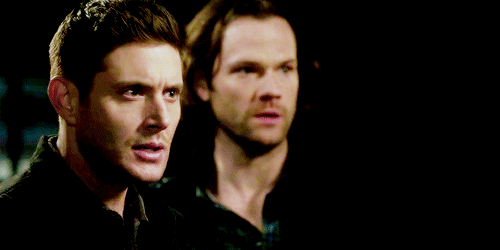
x
Dean, whom Cas -- from the point of first contact in realtime canon -- forged a profound bond with (the bond that proliferated into an intrinsically complex underlying romance narrative which worldwide audiences have been devoutly privy to) was struck by harrowing shock here, and TPTB took intentional liberties to visually fixate on Dean. Sam, on the other hand, reacted via wariness, and he was placed in the periphery -- blurred out to juxtapose their varied emotions of brother and husband; one of these is, as per usual, not like the other.
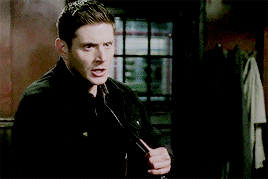
x
Dean realizes the integral role Cas currently holds in his life -- how far they’ve come together, in that the Goodbye Stranger parallel scene between him and Cas has him begging for Cas to stop -- to no avail -- and my heart lurched awfully when Cas made no move to do so. Dean fails in breaking his personal Naomi bred-reminiscent Soldier coding because we all know this certain iteration of Cas never freely chose Humanity.
He never Fell, never embodied the human principles of free will/autonomy and self-identity, never found kinship, and never fell in love with Dean.
Keeping the above in mind, when the real Cas comes back to the bunker after the ever-palpable and necessary self-catharsis that occurred during his absence, TPTB’s narrative brings the episode’s thematic premise of WANT vs NEED full circle as Mary, Sam, and Dean witness his entrance.
Sam and Mary are awed after the temporal fracture ordeal they just experienced, but there lies, once again, a certain cinematographic focus on (12x19-reminiscent) Dean.

x

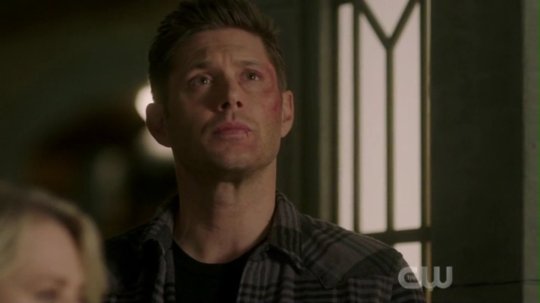
x
We observe Dean’s onscreen expression of raw appreciation and self-conviction in that he has realized, amongst the throes of meta-laden cathartic self-acceptance, that everything he encountered since childhood -- the good, bad, in-between -- was worth it. This current canon reality is his heart’s deepest desire. He accepts it. He WANTS it.
For Dean Winchester, a life without Cas is no life at all.
RATING: 10/10
#omg I'm sure I forget other certain details but AHH#supernatural#spn s14#14x13#destiel#the greatest love story ever told#CATHARSIS#hunters in love#romance tropes#sam winchester#dean winchester#mary winchester#team free will#tfw#jack winchester#my stuff#my meta#CHARACTER DEVELOPMENT#john winchester's a+ parenting#dean is in love with cas#BROTHER VS HUSBAND#LOVE AND...LOVE#endgame destiel#textual destiel#THIS IS A DABB APPRECIATION BLOG#this is a GLYNN APPRECIATION BLOG#THIS IS A WANEK APPRECIATION BLOG#an EVERYTHING blog tbh lol#long post for ts#FAMILY IS UNITY
483 notes
·
View notes
Photo

Emitaï (1971, Senegal)
In 1963, Borom Sarret became the first African film to be directed a black African. I imagine many people reading that last sentence are thinking to themselves, “what took so long?” Simple: colonial governments forbade film productions by native Africans. With Senegal becoming independent from France in 1960, this allowed Ousmane Sembène to be the first black African director on a short (Borom Sarret) and a feature-length film (1966’s Black Girl). Before Borom Sarret, Sembène was primarily an author residing in France (he smuggled himself to Paris in 1947) – his literary works commented on colonialism, racism, identity, and tribal relations. Around 1960, Sembène found himself fascinated with films and wished to experiment in how to express his ideas through a visual medium. Studying filmmaking for a year in Moscow gave him the skill needed to return to Senegal, intent on crafting films for his fellow Senegalese (Senegal recorded a 51.9% literacy rate in 2017, so Sembène’s writing was inaccessible to many), to help them see and understand the lives and cultures similar or dissimilar to their own.
Sembène, born to a Lebou family among fellow tribespersons, turns his focus to the Diola – an ethnic minority also known as Jola – people for Emitaï (sometimes translated to “God of Thunder”, but it refers to a supreme, remote being). The Diola have a language quite different from Wolof, Senegal’s lingua franca, and the Diola language has several dialects. While directing Emitaï, Sembène learned the specific dialect used by the villagers used as extras in this film. That local dialect is the language used in the film, not Wolof as many websites and film databases online claim. Here, we learn how – through the Diola’s culture – they comprehend and react to the dilemma they contend with in this film. Soon enough, the audience learns of the spiritual richness of the tribe depicted and witnesses the French characters’ contempt towards the Diola’s way of life. Emitaï is a remarkable film, paced to the tempo of life in a rural village, and deeply attuned to storytelling traditions not often honored in film.
Somewhere in the Casamance region of Senegal, black Vichy French soldiers are abducting several Diola tribesman, forcibly conscripting them into service. Vichy France fought with the Axis powers, as it was a puppet state of Nazi Germany. Back in the village, the tribal elders are discussing if they should respond, given that these abductions are interfering with the rice harvest. No action is taken and the film progresses one year. It is the summer of 1944. French colonial officers – Robert Fontaine (“Monsieur” in Black Girl) as the Commandant, Michel Remaudeau the Lieutenant (as well as cinematographer), Pierre Blanchard the Colonel – follow orders to enforce a severe rice tax on tribal villages. They dispatch a detachment of black troops to that Diola village to levy said tax (this detachment includes the men abducted the prior year). As the conscripts round up the locals, the tribal leaders consult their animistic gods and the women rebel against the French officers and the tribesmen-turned-soldiers.
Emitaï tells its story at its own pace. The camera is kept apart from tribespersons and French soldiers alike, keeping them in a full or medium shot, rarely employing close-ups. The surrounding nature is depicted to suggest the villagers’ relationship with nature. Winds sigh through the trees and tall grasses, the nearby marshes (maybe unclaimed by agriculture) form the background for the rice harvesting scenes, and we hear nothing but the sloshes of water during a boating scene. Conversations between individuals, a group, or antagonistic groups develop, intensify, and subside without a cut taking the viewer to someplace else. The conversations are self-contained within the seconds or minutes they occur between characters or groups; the effectiveness of these scene is thanks to the fact that the characters believably are without certain knowledge about what is happening in other parts of the village. There are no knowing winks to others (or the audience), no clever asides that would feel inappropriate in a tale of colonial oppression. Yet, Sembène’s film never putters in philosophical circles nor feels plodding. Less patient filmmakers or those who too stubbornly subscribe to postmodernism might feel unsettled here, wishing to whisk the audience from a scene before a Major Plot Reveal (this might be culturally compatible with Sembène’s or the Diola’s understanding of how they share stories) with their itchy fingers. Sembène uses this time to help viewers learn about the Diola. Whether one might be a non-Diola from Senegal or from the other side of the Earth, we learn basic aspects about Diola culture that amplifies how we feel when we see the villagers being rounded up and young, able-bodied men who just happened to evade French capture taking arms against African-wielded, European-engineered munitions.
The Diola worship and fear their gods, and the rice they harvest is not only for themselves, but used as an offering to their gods. And as the tribal elders communicate with the gods, the quality of their rice harvest may impact how their gods converse with them – there is one fantastical sequence where this occurs. Some viewers might see the dialogue with the gods as a delusion, an unnecessary detour in an allegedly straightforward colonizer-versus-colonized narrative. But recall that Sembène wanted to make films so that his fellow Senegalese – no matter their ethnicity, linguistic skills, or religion – could empathize or see their histories onscreen. The Diola believe in these animistic gods to keep their families and villages at peace (although – though not portrayed in the film – some Christian and Islamic influences have been introduced), to guide them when an enemy is bearing down on them. Who are we to say they are wrong for doing so? Sembène, who also wrote the screenplay, may not have been Diola himself, but he clearly showed enough respect and attention to them that he would allow their gods have a presence in Emitaï. A Diola did not write Emitaï, but those moments with the gods – a daring decision that I am unaware has any such parallels in a colonizer-versus-colonized film – and the inclusion of a few funeral ceremony scenes complement the “voice” of the Diola. Traditions of African folk stories and religions are prevalent in how Emitaï is shot and how its story unfolds – including, as a pervasive convention in these traditions, a tree that connects humans to a spiritual plane.
The tribal leaders in Emitaï appear to be all men. The women of the village are mostly seen as tending to the children, as well as performing the bulk of the rice harvest. They are the first to be detained by the forcibly conscripted soldiers, but not in a position of distress. After a skirmish between some of the young, uncaptured men and the French forces, the women arrange an impromptu funeral procession for one of the fallen tribal leaders. They sing what sound like celebratory, not mournful, songs – perhaps for a life well lived, bravery in defending the Diola way of life. What should be uncontroversial becomes rebellion. With forcible conscription may result in further encroachments on Diola culture. Already their sacred harvest is disrupted, so what might be next? In Black Girl, Sembène’s feminist arguments circulated around personal discontent and racial subjugation. Though not nearly as intimately portrayed here, Emitaï expands on those themes – showing us the solidarity of the oppressed women. None of the black characters in Emitaï are professional actors and none of the women are given character names. Nameless though they may be (perhaps this was an attempt to “universalize” the film to the tribal peoples of Senegal), the village’s women seldom appear helpless as the conscripted soldiers force them into position by the sides of their rifles or the French officers barking at them about the location of hidden rice. Unarmed and forced to sit in the baking sun, they are stronger that anyone might guess.
Their understanding of “the white man’s war” is limited and the Diola feel little responsibility in helping the French officers fight it. A message delivered in the final minutes reveals that Marshal Philippe Pétain (Vichy France’s leader) has been deposed by Charles de Gaulle, meaning that the Allies have liberated France from the Axis (Sembène – who himself was drafted into France’s colonial infantry and later served among the Free French Forces – makes a cameo appearance here as the soldier ridiculing de Gaulle for being ranked lower than Pétain). Leadership has changed thousands of miles away, but the situation for all the native Africans – soldiers and civilians alike – is unchanged. Allied victory has brought not liberation, but a new poster of some mustachioed, uptight Frenchman who just happens to now be in charge. The casual cruelty and cultural ignorance on display by the French – as they complain of the backwardness of where they are stationed and how the most consequential decisions are being made by military bureaucracy – is rather restrained. Though it would be difficult to recall any nobility among the French soldiers, they do possess a cartoonish, outward malice. Sembène castigates the French characters and colonialism not through soliloquies, but their escalations and actions. Emitaï’s most violent moment is never shown on-camera, yet it was enough to provoke French censors to scrub the scene (among others). Ironically, despite Senegal’s independence from France eleven years prior, this meant the film could not be released in its entirety in France or French-speaking Africa until 1976 – five years after its debut at the Moscow International Film Festival.
Nor did Sembène catch a break from Senegalese censors. President Léopold Senghor’s regime censored Sembène’s films regularly: Sembène’s next feature, Xala (1975), excoriated colonialist institutions that remained in Senegal post-independence and its lead actor was chosen partly due to his resemblance to President Senghor (it doesn’t help that the plot revolves around the lead character looking for a cure for his sudden impotence). In the case of Emitaï, the reasons are not readily available, but the censorship most likely was targeted towards how the forcibly conscripted soldiers are depicted. The dynamic that the Senegalese censors singled out in Emitaï would be multiplied and inflamed by Sembène’s Ceddo (1977) – that film is set shortly after France establishes a colonial government in Senegal; there, Sembène draws parallels between that film’s tribal leaders and future Africans who would conspire with European slave traders (the Senegalese government’s perceptions that the film criticized Senegal’s political leadership and bourgeoisie was accurate, but that is a story to be told when I review Ceddo).
An unofficial sequel to Emitaï was released in 1988, Camp de Thiaroye. That film touched upon many of the themes Sembène remarks upon in Emitaï: the destruction of identity among African soldiers in the French military, violence in the name of colonialism, and structures of racial supremacy. It, too, was censored in France and Senegal upon release. But by Emitaï, Sembène’s cinematic style – freed from the constraints of speech and linguistic barriers – had become crystallized. Like his prior works, Emitaï is uncompromising in its depiction of human cruelty and how that is manifested in colonial or neocolonial paradigms. He criticizes so effectively by juxtaposing behavior, not through rhetoric – it matters not if the oppressor is white (as they almost always are in his films) or black. Away from urban settings, his pacing adapts to the surrounding environment, the slow and seasonal life of the Diola village. Many who see Emitaï will not recognize much of the life and culture of the Diola. It is a testament to Sembène that he makes this biting film so empathic and compelling.
My rating: 9/10
^ Based on my personal imdb rating. Half-points are always rounded down. My interpretation of that ratings system can be found here.
#Emitai#Emitaï#Ousmane Sembene#Ousmane Sembène#TCM#Andongo Diabon#Robert Fontaine#Michel Renaudeau#Ousmane Camara#Ibou Camara#Alphonse Diatta#Pierre Blanchard#Cherif Tamba#Fode Cambay#Michel Remaudeau#My Movie Odyssey
4 notes
·
View notes
Text
The 100 - 6x04: The face behind the glass review and predictions.
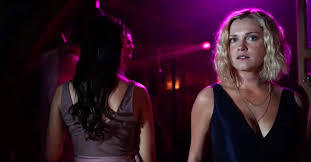
Before we get into the specifics, I’m a little scared of the rehashing of old narratives that comes to surface in this episode especially. Not sure how I feel about all the parallels. In my trailer analysis, I did point out the fact that it does not seem that much different than previous seasons: There are no good guys, we kill them so that we can live and blah, blah, blah. Even so, I’m interested and invested to see what types of unique twists and turns this story will throw at us. Jason Rothenberg, you better not disappoint.
The face behind the glass written by Charmaine DeGrate and directed by Tim Scanlan, who is known for directing the sex scenes on the show. Dead giveaway. Not my favorite so far, but a lot of things happened that has me excited for the rest of the season.
Is there a better way to open an episode than Diyoza joking with her unborn child? It’s no secret she’s in my top 5 favorite characters and keeps climbing the charts. So, the Sanctumites offer her a deal: Save Rose and we’ll take care of your baby, which she takes, to offer her child a life and it’s something to do other than trying to survive. But in known Diyoza fashion on condition of a gun and a bike.
Then, Simone begs Russel to cancel naming day on account of spies inside the compund. They’ve already been deprived of three primes (Kaylee’s family) and Rose. Pushing them towards extinction at an alarming rate and it once again becomes obvious that Clarke will become Josephine, yet I’m now intrigued by Madi. The cultish way in which these people worship the primes are uncanny and wayward. But then again all cults are weird. I don’t believe in the divinity of the primes either.
Russel disagrees by saying: “If we cancel, Gabriel wins.” Last week I thought that Gabriel will be brought back to life in one of the hosts, but I think there’s something else going on there. It’s clear now that Gabriel and his children are against the revival of the primes, bringing about the question: How has he survived all these years?
Priya and Jordan share some sweet intimate moments where he tells her he feels guilty for becoming another taunting face behind the glass. Which was necessary to show he’s still grieving his parents even while having fun. Her referral to this line later before she becomes a prime is crucial though, meaning there might be a possibility for her to come back.
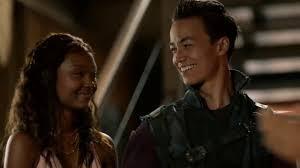
The four pillars of Sanctum: Repent, Renew, Rejoice, Rebirth. Accentuating rebirth very literally. We know from episode two that Russel Lightbourne does not believe in God, but by killing a person for no reason other than so that someone you love can live is playing god in the cruelest way imaginable.
Embracing their traditions, Clarke decides to repent for her sins. She tries to apologize to Raven who won’t have any of it and compares her to Octavia. For me, the biggest difference between Clarke and Octavia is the remorse she feels. She knows what she did was wrong and she’s trying to make up for it. Therefore she deserves forgiveness. I wonder how Raven will react to Clarke’s death?
Gabriel? Who the f#@k are Gabriel and his children?
As I said earlier, the old man is definitely Gabriel. We don’t know if he’s dead or alive. It can’t be that he lives within a computer because then his existence would be known.
My guess is the split within Sanctum came recently (using the term loosely). Gabriel had to be one of the 12 primes since he came with them and his blood was also altered. Meaning his conscience was also transferred into a host. He was against the hostile takeover of innocent bodies and decided to rebel by saving the hosts.
If this happened sixty odd years ago, Gabriel could still be alive somewhere (perhaps in hiding due to a failed conviction) and old. Very, very old. I’m not sure whether his followers are literally his children or just those that have sided with him, but either way, they want to continue his cause. Which they’ve clearly lost sight of. Save the hosts, don’t kill them.
Or this anomaly they mentioned somehow extends life, only it’s dangerous. Who knows, I’m a bit boggled here.
Xavier purposefully left his bag out to save Octavia and Rose. I’m sure I’ve seen this before. Right, Lincoln kidnapped her and saved her simultaneously. I know this is such a retelling of their story, but I loved Linctavia and thus cannot help boarding this ship.
Another season one throwback to Bellamy and Charlotte. But I think I’ve voiced my concerns about these. Poor, poor Rose. That scene was heartbreaking.
Boy oh boy Bellarke and their romances
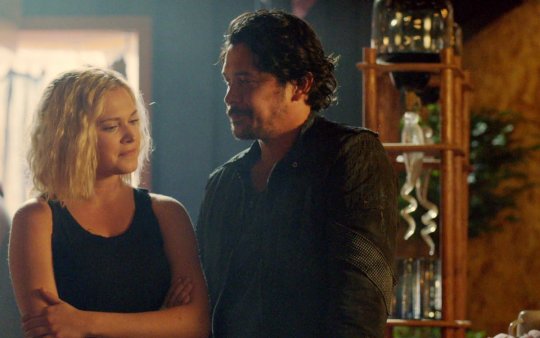
Clarke apologizes to Bellamy and states her reasons even though Bellamy has already forgiven her because he would be a hypocrite not to. And they share what has now become known as a Bellarke hug since it’s all these idiots can ever do.
Clarke hooks up with Cillian (who turns out to be the spy) within two seconds, now I’m not sure about you, but I rolled my eyes. Oh, cute, Clarke has yet another lover added to her long list of previous ones. Finn, Niyalah, Lexa, and Bellamy always on the side. I’m glad it’s a guy though to showcase that she is indeed bisexual and not gay. Bisexuality really needs some appreciation.
No one can tell if Bellamy was only upset with the party as he stated or Clarke having fun with some random dude. Most will say it’s the former and it probably is, yet it’s filmed in a different way. Why did they put him in this scene in the first place?
When he sees her having fun, he smiles, he’s happy for her. Then the doctor’s all over her and all of a sudden his attitude changes. I don’t want to read too much into it since I had to watch it like six times to draw this conclusion.
He’s hurt and grieving over a lot of things, especially his sister and then he witnesses his “platonic soulmate” in the arms of another man. She’s always known exactly how to get him to open up, what to say to make him feel better and even though he knows he’s not allowed to feel that way, he’s jealous, he realizes he still needs her.
And that spurs the single tear and his fight with Echo. He even spares another glance over his shoulder when she asks what’s wrong. Or was that just random? Because once he’s calmed down he apologizes to his girlfriend and comforts her when she tells him her backstory after six years of being lied to.
I felt for Echo, her life wasn’t easy, but none of their lives were. Honestly, I just can’t find Becho’s connection. Even though I try, because at some point we have to accept the fact that this is possibly a long term pairing. I’ve made my peace, I’ll ignore them. Give Echo an individual storyline and I might just start liking her more.
A Red Queen and a terrorist walk into a bar
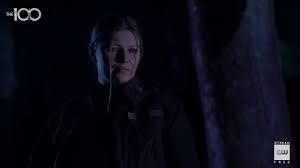
First of all, I have to show my gratitude for the glimpses of Octavia’s humanity. She’s in there and she’s slowly swimming to the top. That thorned rose is blossoming once again, thank you, Bellamy, for your part in this.
This is a weapon of mass destruction if I’ve ever seen one. A pregnant terrorist and a former evil queen. Yes, this is what I’m talking about. I might just write fanfiction about it.
“The devils of earth become the heroes of Sanctum.” They’re set out to kill Gabriel, but I doubt that will occur. From all I’ve heard, he’s good. Enhanced by Cillian’s words: “There are two sides to every story.” So, they will most likely join forces against Sanctum in some way. Hopefully not blowing up another planet. Please do something interesting here.
Josephine!Clarke
Okay, my first take on Josephine Ada Lightbourne was very wrong. To me, she seemed smart, funny and confident. Now she looks like the devil in disguise (No pun intended.)
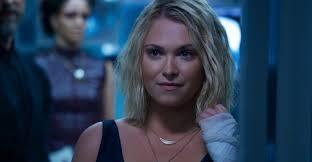
Reverting back to my earlier assumption about Delilah/Priya. It’s evident that Delilah no longer exists within her body which sets Jordan on edge. But that small statement along with knowing the mind of the host is erased but the brain is unharmed propels me to believe they can come back. Somehow. Hopefully.
Simone says, “I’ll prep for insertion, you clear the host.” Did that mean Clarke’s mind might be stored in some device too? They must have a way of extracting consciousness to transfer it to a host. Thus Clarke Griffin’s mind will be backed up somewhere as well. Not for too long before it’s disposed of, I’m sure.
Come on Madi (Lexa and Becca), Bellamy, Abby, Jordan, Raven, Murphy. You have to figure this out and bring her back before its too late. I refuse to believe Princess Clarke is dead. If she is, my mind is blown in a bullet to the brain kind of way.
One scenario is that Josephine will have to give forth a ruse of being Clarke and willingly accept the “honor” of becoming a prime. She’s been indulging in all their other conventions, why not this one, right? But Jordan now knows what happened to Delilah, so they will try to stop her. Most likely Madi or Bellamy will notice a difference within her.
The dangerous alternative will be for Josephine to simply embrace her new host by saying they brought her to life after Cillian murdered her. Sanctumites, you have no idea how much Clarke’s people care about her. This might even sway those currently mad at her for an investigation.
A few last things
Russel does feel bad about what he’s doing, but so did Dante Wallace.
Raven and Wick (Sorry the other mechanic) what is that? Five minutes after Shaw’s death. Or was it only the motorcycle. Why does this show give us seedlings of relationships that will have no chance of growing?
Is Shadeheda Cadogen and what will he bring to the table?
Madi tasting her first cookie was awesome!
I missed Murphy this episode. His presence is required at all times.
What will happen to Niylah on the ship? And when will Indra make her appearance?
Will Russel and Simone find out that Abby knows how to create nightblood?
Let me know what you think.
#The 100#the100#the 100 season 6#The 100 s6#the1006x04#the 100 season six#the 100 6x04#the100 6x04#the100 6x04 review
15 notes
·
View notes
Text
Variety: ‘Les Miserables’ Team Talks Importance of Victor Hugo’s Tale as ‘Story for the World’
When Victor Hugo wrote the 1900-page tome “Les Misérables” in 1862, he gave the world a transcending and sweeping tale that dissected the division of class while breathing life into complex characters spanning decades. Unfortunately, no matter what your stance on musical theater, much of that tome has since been lost in Broadway and big screen iterations.
Given that the book is one of the longest ever written, that comes as no surprise.
Enter the incoming six-part PBS Masterpiece limited series “Les Misérables,” a music-free offering aiming to introduce the novel’s intricate themes and plots to new and older audiences alike in a more intimate setting. Dominic West, David Oyelowo and Lily Collins star in the ambitious Belgium-shot production, which already aired across the pond on the BBC.
Retelling a classic that’s been told so many times certainly comes with its challenges, but Hugo’s story was one producers and scribe Andrew Davies felt was important to tackle in today’s political climate. Here, Variety talks with Davies and executive producer Faith Penhale to discuss those challenges, recreating memorable scenes in a new way, and why now is the time for “Les Mis” to return.
Penhale: We all felt that we knew the book and thought there was an opportunity to tell the story as Hugo intended with a serialized adaptation. Instead of having 90 minutes or two hours at most to tell the story as a musical or film, we had six hours to really dive into all of the themes and all of the characters as Hugo originally intended. It’s a vast novel. One of the beautiful things about working on a television adaptation, and in the serialized form, is you get the space: You get the opportunity to really tell stories with the breadth and the depth that you just don’t always get when you are working within a much shorter timeframe. That was one reason, and also if you really dig into the story of “Les Misérables” and look back at when Hugo wrote the book, he wrote it with a very clear intention in mind. He wrote it to really tell the story of the underclass who were living with no safety net. He wrote it not just about France, but he wrote it as a story for the world. Some of those themes and questions that he emphasized in the story really resonate today in the challenging times we live in. It also felt as though we had the opportunity by having the story to really connect with today’s modern audience.
Davies: There are parallels between Paris then and London or America today. There seems like a widening of the gap between rich and poor, a society where we have seen homeless people begging in the streets as opera-goers step over them. It just seemed that it was a good time to do it again. I guess another reason why is I wanted to show the book as a whole as distinct from the slice of it that we get in the musical. I started working on this before I ever saw the musical so I already had my version in outline before I went to see it. And I was kind of startled by how shallow and partial the presentation of the book in the musical was — how little drama in fact there was in it. It seemed like there was a big opportunity and a chance to either introduce the story to people who didn’t know it or to show people who only knew the musical there was a lot in the book that they haven’t seen.
Specifically what got lost in the translation to the musical that you’re able to bring back here?
Penhale: Fantine’s story is one that really struck us. In the novel you get a sense from the beginning of a girl who has her life ahead of her, who she has a sort of optimism of a young woman embarking on the rest of her life. As you follow that story and [learn] what happens to her you begin to really feel and understand the story of a young girl living with fallen circumstances where society and all levels are working against her. I’ve never felt that story has been really brought to life in a way that we’ve been able to do with this adaptation. You’re really able to get under the skin of these characters.
Davies: Recreating [the early bits with Fantine] and putting it on the screen it felt a bit like the world of a Renoir painting. Renoir, Degas, working class pleasures. Boating on the Seine, open-air picnics, pretty girls and wealthy students. … The other bit that I find particularly engaging and moving was Jean Valjean’s relationship with Cosette. A man who had never really learned to love finding out what love was all about through adopting this little girl, and how intense and happy their relationship was. And then having to let her go, which in a way is emblematic of something all fathers know about, certainly I do. Watching Dominic play that relationship and having to let his daughter go was very powerful for me.
How did not having the musical requirements open up casting?
Penhale: We approached this as a really premium, quality piece of drama and for us where this was hugely exciting is we could really think about the casting in terms of who are the most exciting actors working at the moment and who was right to come into this. It was an enjoyable process of looking for the best actors.
What other challenges did you face in bringing this story to life for the small screen?
Penhale: One of the biggest things you feel when you take on an iconic piece of literary fiction is this huge responsibility to deliver the story really powerfully and well for the audience. There are iconic moments in “Misérables” that everybody knows, everybody is aware of. Everybody knows of the barricades. You have to be able to really deliver that to the audience. So part of it is that we set the bar very high for ourselves. You have to do that really well and you can’t disappoint.
Davies: There were huge moments in the book and they were what I set out to dramatize. They were also what I was interested in — bringing out all of the interesting connections in the way the characters link up. The chronology of the book is quite eccentric and I thought it would be valuable to straighten it out and begin the story with the aftermath of The Battle of Waterloo.
What did shooting in Belgium add to the project?
Penhale: Another challenge is you don’t have a limitless budget to draw on and so you have to have conversations around how are you delivering this authentically and cinematically. That’s a process. [Director] Tom Shankland had a clear sense of how he wanted to portray the world on screen and how he could achieve that and hats off to him for doing the most epic and cinematic job, but at the same time really focusing on performance. We took the decision early on that we wanted to shoot on location as much as possible near to where the story might have played out, so we shot in northern France and southern Belgium so that we could basically capture the feel of these French towns and the French countryside and make it feel as real as possible.
Was six hours enough time to properly tell this story?
Penhale: Six hours is a great length for the story. This will cover 17 years, you have a lot of time to cross and a lot of characters that grow with you.
Davies: As it turned out, that last episode ran an hour and 20 minutes in the U.K. Even then a lot of scenes had to go down in time in the edit; it could’ve been eight hours easily.
How else might themes of “them” versus “us” play out in the wake of Donald Trump’s wall or Brexit?
Penhale: “Les Misérables” tells the story about a whole sort of society finding a voice and speaking out and challenging the establishment. That’s essentially the skirmish that you see that leads to the barricade. It’s about a whole community of people standing up for what they believe in and fighting for a better world. You just have to look around, even beyond Britain or America. It’s a global phenomenon at the moment and much talked about in the news, the connections between those who are making decisions and those who have to live with those decisions on the day-to-day. There is absolutely a rift and gulf between the establishment and the society that people are living in in the world, and this absolutely echoes the sentiment and challenges that we struggle with today.
PBS Masterpiece’s “Les Misérables” debuts Sunday, April 14 at 9 p.m.
x
1 note
·
View note